#they may have had even less in common as children. or what they had in common was superficial.
Text
Ohhhhhhh. Okay.
(thoughts/revelations about bride alt Sharena jumpscare)
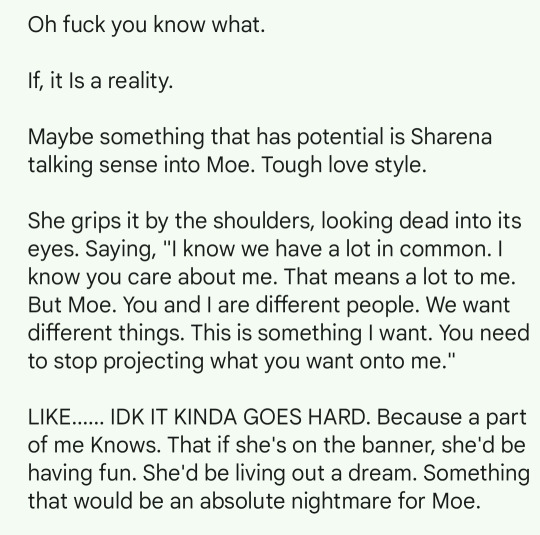
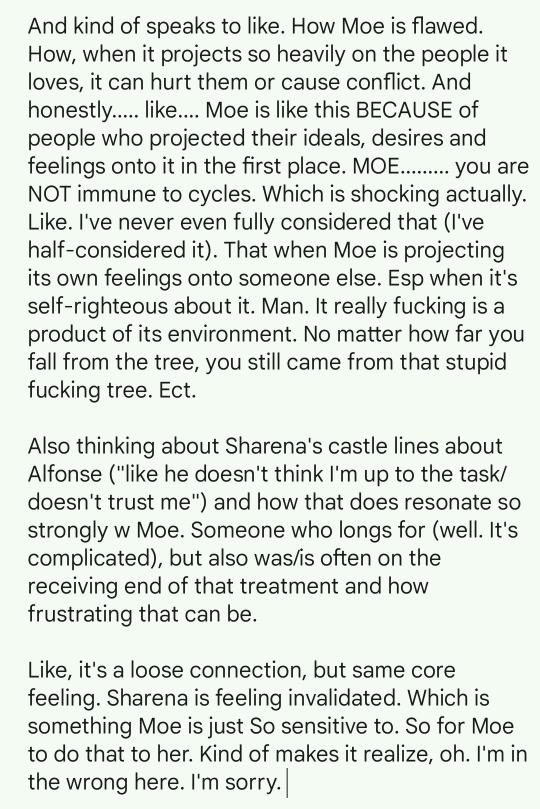
#moe tag#moe lore#i'm like. doing some preemptive coping bc i am going to be stressed the fuck out over it all day if not LMFAOO#LIKE....... i know it's not that serious. but like. it almost kind of is. to me.#i just. i almost have like a trigger reaction to it. like the topic in general. it's crazy.#but also i think this captures something significant between moe/sharena and why peony is sharena's primary parallel#like when writing moe/its backstory it's interesting to try and find that line. where it is friends w her/they have a lot in common#but they are also undeniably fundamentally different.#to the point where like. in the past moe was just someone who was a friend but ultimately slipped through the cracks#they may have had even less in common as children. or what they had in common was superficial.#either way moe is fucked up beyond belief. and needs to be shaken by the shoulders sometimes.#no maintags bc. i do feel embarrassed getting SO worked up over this#but man. idk i just can't help it. but also. i gotta do something about it. at very least acknowledge like#this is making me feel a certain way and i have to figure out what to do w those feelings now.#take responsibility. ect ect.
2 notes
·
View notes
Text
A DC X DP IDEA #4 You’re worth is more than a penny.
Imagine dis…
We all read and saw fanfictions about either Jason, Constantine, Bruce, or even Jazz raising Danny when he became younger due to Clockwork’s interference, but what if we reverse the roles?
Alfred Pennyworth was raised by Phantom.
It was early 1900 in England where it is common for children were being sold like cattle for a penny. Among the rows of yelling parents who are willing to sell a few of their children for a few pounds to help themselves or the younger ones at home, one parent was loudly exclaiming that his child is merely worth more than a penny. A nameless child with skin and bones as a body, at the tender age of 6 years old he already knew the horrors of child slavery. Some were never seen again like the ones he saw outside playing tag and others return to their parents in a body bag. He also knew that no one would want a skinny child like him so he waited for the inevitable beating at this man’s house, He refuse to call that man his father nor that dingy four-by-four wall home.
Suddenly a distinguished gentleman walked past him and he was just in awe at what he had sawed. A young man that seemed like in his early 20s has a face of youth yet has an air of maturity around them. Wearing the cleanest pair of white waistcoats and black trousers, shaggy black hair, and striking blue eyes.
It was obvious that he was an errand boy looking around for new workers, his mind supplied.
The man looked at him with raised eyebrows and couldn’t help but think that this person may buy him out of this man’s clutches and put him to work that may or may not end his life.
The older man who saw the interested look of the errand boy tried to advertise him as his worth is merely a penny.
…
Danny was merely taking a break from his kingly duties after months, years, and centuries have passed since his adventures as Danny Phantom. Visiting a newly made dimension in the eyes of the king of Infinite Realms, he made his way through the early 1900s for some sight-seeing, with the insurance from his advisers, court, family members, and consorts (Tucker & Sam) he went and enjoyed the view and contemplating that why does Clockwork give him his farewell in a form of a cryptic message such as a father of a bat needs saving from his unexpected fate, as well this universe felt like something interesting is bound to happen.
Being the High King of the Infinite Realms the realms itself chose him as their champion and king through countless rights of ascensions throughout the years.
Seeing that child slavery is still a thing at this point in time made him want to turn around and go to another realm less depressing than this time and come back later when they abolished slavery.
Though he caught an eye on this thin scrawny little boy who is nothing but skin and bones that the tiniest gust of wind will push him on the brick pavement, the boy’s parents however saw him taking interest and tried to get rid of the boy seeing that he was nothing but an extra mouth to feed due to his “responsibility” as a parent and tried to sell him for a penny.
Danny weighed the pros and cons in this situation, raising a mortal child may be both rewarding and satisfactory but the fact that he cannot break the ancient rules to make him immortal that was placed by the Realms themselves to uphold the balance between the living and the ancient realm, but he can bend it to an extent, so that if he can extend longevity in his lifespan to at least reach a century or so.
Added to the fact that Clockwork gave a message to protect him.
Bought the boy for a penny and carried the child towards the disguised horse carriage.
Now, how to explain to his family that he acquired a mortal child?
…
The nameless boy widened his eyes in surprise as the “errand” boy actually bought and carried him gently towards a clean carriage that looked like is owned by a king.
After making him sit beside his employer, his employer began asking him questions.
Such as his age, and name. likes, dislikes, and many other confusing questions.
At the mention of not having a name his employer began to frown, looks like he has made his new employer furious and he hasn’t even begun to earn his keep.
After a tense silence, his employer declared that HIS new name would be Alfred Pennyworth, as the word Alfred means counsel as he stated that he can see his future and that he would counsel different men who wish his advice, and Pennyworth, as his father is a fool for selling him for a penny as he is worth more than that.
At the time the nameless no…, At the time Alfred didn’t know what is the warm feeling on his chest that made him long for this man’s approval. He may be naïve or far too trusting for putting his trust in a man he met for a few minutes but at the time his only thought was he had his own name that he owns.
When the carriage stopped his employer carried him out of the carriage, and what greeted him is something he would never forget.
An endless green sky stretches along the horizon, A large black castle that reaches the sky that has growing vines all over its walls, at the front an entire estate dedicated to different and extinct plant life to flourish, and rows and rows of servants lined up and dressed in the fanciest clothing for maids and for all genders bowing ever slightly greeting and welcoming back their master in unison.
He looked behind him and around him for the master of the house but when he couldn’t see one, he turned his attention to the one who bought him as he is quite sacred for upsetting for not greeting the master in his own house.
But as he turn to the man for a plea for help he caught the small smile that his employer gave him and nodded towards the directions of the servants.
That was the time he learned that the man who bought him and gave him a name is his supposed master.
…
The next few days were confusing to the young Alfred Pennyworth, as he expected to be working on the animal shed or any menial tasks yet he was treated like a prince.
Free to learn what he desired, learning skills that he would never think of learning, free to eat anything his heart and stomach desired, free to have a soft bed to sleep on as well as having toys to ensure that he was not bored, given a wide variety of possible hobbies to take his mind off things. Gained and learned philosophies around the realms as well as had great teachers in teaching him essential things in morals, science, and more. Most importantly gained a family that he never thought he would even have.
He learned how to walk silently as a ghost, be swift in terms of movements waster no action, be present like a shadow, and use any weapon at hand, one’s body is a weapon itself. Discipline thy self in any temptation known to man, to integrate oneself to be unknown, eyes and emotions betray your mind be mindful of your facial and body movement as a single doubt will get someone you love to perish, but most importantly learned his new family’s motto.
Family is family.
Simple yet a powerful motto. No matter how cruel the man who brought and gave him a new life and purpose, the man who he saw as father, maybe in making decisions to ensure that the Infinite Realms stay balanced throughout the entire realms. How ruthless are his aunts and uncle to make sure that everything in between stays in the center of the balance as too much of the brings chaos
When Alfred was merely a teen he was given a blessing by his father, to be able to live a long life while maintaining his morality. One day he may die which is true, but it will be a long time before the reaper takes him to his next adventure.
Spending time with each member of the Nightingale family are memories that will be kept deep inside his heart. His mother Sam, taught him the wonders and secrets of flora, his other father Tucker, taught him how technology is used both in hope and destruction, His uncle Dan taught him about being an impenetrable wall in both mind and body, His older aunt Jazz taught him how to read his opponents in combat as well learning the beauty of human brain, His aunt Ellie who taught and showed him the wonders of the world in terms of the scenery, delicacy and culture, His grandfather Clockwork, taught him to be a cryptic as well moving on and forward as bad things are as natural as breathing and to move on is to let the time run its course.
Last but not least his father Danny, the High King of the Infinite Realms the man who he owes his entire being and life. The man whom he respects and wishes to turn out like him, the man who is proud to call his father. Taught him a multitude of things that one would not expect from a king, Be a Gentleman. A firm handshake combined with looking the other person in the eye carries with it respect, dignity, and strength, Honor Your Father and Mother, Respect Women, Be a Man of Integrity, Take Responsibility, and Work Hard, among the advice he gave and taught to him that they put into his life through action and words.
When WW2 came to his dimension he asked his father to be able to go back as it is still integrated into his blood to fight for the country that he was born into. As well as making a name for himself, to prove to the world his worth is more than a penny, to prove that all of their learning is not to be put to waste.
With the approval of his family, he set out to make his name.
S.A.S. Armed Services, fighting in 15 different operations between ages 18 and 20. A skilled medical and front liner soldier who was decorated. He later joined MI5, as well the secret forces of the Queen and later being knighted by her majesty
…
In this present time, we all know the current Alfred Pennyworth, the kickass ninja butler who is a mystery to the Batfam and has a lot of skillsets that are both surprising and expected to the Batfam. The butler who dared to out Batman the Batman. The butler is willing and dared to ground Batman for not taking care of himself. The butler carries a shotgun out of defense and we are pretty sure he is hiding a hidden bazooka somewhere in the manor. The butler who cooked delicious food and the one who raised Bruce Wayne
…
Working for the Wayne is not set to be permanent but the moment his ward Bruce Wayne becomes a hero just like his father and brings in his own version of a makeshift family he cannot help but stay for the sake of his ward that he saw as a son.
His family was there every step of the way.
Looking at the long dinner table that is filled with food with his ward/ son and his children he can't help but look fondly at the scene in front of him.
This is why he would not eat with the rest of the Batfam, the ambitious dinner or just being complete brings him back just when he was just a little boy looking at his father for guidance.
…
The Bat family are known to be good sometimes great detectives as they were taught by the greatest detective in the world, despite their wit and intelligence they still could not figure out their grandfather/ butler.
Having no presence before WW2 is common, as many orphans joined the war to bring acknowledgment to their names and presences. So when a glowing green letter made its way towards the kitchen counter, just as Alfred took a moment to look when he immediately snatched the said letter and ripped it open to see the contents.
Now mind you this was a never occurrence as Alfred Pennyworth is the epitome of calmness and neutrality so when he tore a letter like a kid who was given his first Christmas present all noise seemed to stop to look at the wide-eyed butler.
Alfred kept reading the said letter with wide eyes ignoring the shocked look of the people around him. Immediately telling Bruce that he will be going on an immediate 2-week vacation without even concealing his own joy in his voice and quickly turned around to pack a suitcase worth.
The entire Wayne’s both adopted and not are now invested what could the letter possibly contain that Alfred Pennyworth himself becomes a kid just by reading it?
Tailing the said butler was hard, following his quick steps which indicate impatience from the patient butler as well as a small smile that indicates fondness immediately became their new case.
Stopping at a large mansion surrounded by plant life that has a gothic aesthetic to it. As Alfred entered the gate he was tackled by a small black-haired blue-eyed child immediately followed by three teens and one large buff young adult.
All of them are hugging and exclaiming joy as Alfred reciprocated each hug with enthusiasm for his age.
Who are they and how does Alfred know all of these people?
…
PS: If someone out there wanting to continue or make a fic about this you are free to do so don’t forget to tag me though.
#dc#dc x dp#dc x dp prompt#bruce wayne#alfred pennyworth#danny phantom#ghost king danny#infinite realms#dp
3K notes
·
View notes
Note
May I request an omega verse where kiribaku adopts omega son pls? thank you!
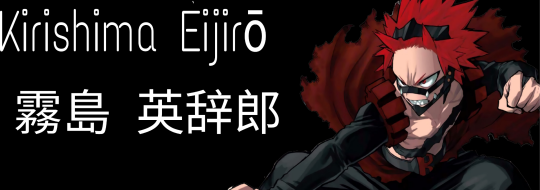

Adoption
Kirishima x Bakugo w/ child male reader
I gotchu, this took longer than expected ngl
Fluff, baby/toddler reader, male reader, alpha Bakugo, alpha kirishima, Omega reader
🌑🌒🌓🌔🌕🌖🌗🌘🌑🌒🌓🌔🌕🌖🌗🌘🌑
Alpha/Alpha couples were more and more common these days, especially in the hero world "a kid?" Kirishima was curious as Bakugo shrugged "a brat would be nice, we have the space and our agency is thriving.." Bakugo said not making eye contact with his mate who looked at him with so much love "it's like you read my mind~" the Alpha said hugging the other who scoffed "whatever shitty hair"
Days turned to weeks and before they knew it they were at an orphanage where a bunch of kids were running around "welcome! The Kirishima-Bakugo family yes?" The orphanage headmaster asked curiously and the two nodded "yeah that's us!" Kirishima said happily and Bakugo grunted "wonderful, sign the sign in forms and if I could please see ID as confirmation?" The two handed over their IDs and the headmaster scanned them "excellent! Why don't I give you two a tour yes? And then you can meet the children?"
The building was nice, up to date and the children were healthy "so what age range are you looking for? Secondary gender?"
"We were hoping to just click with one and go from there" Bakugo let his mate do the talking as kids looked at them curiously "I see, well let's go to the play area and you can interact with the children"
Walking into the play area, kids were all over the place but one caught Bakugos attention, a small pup grabbed his pant leg "oh hello (name)" the headmaster smiled "he's one of the younger ones, only one and a half" they said and fixed the boys pants "he's a happy little Omega but isn't the most talkative but the other kids don't seem to mind" they explain as (name) raised his little arms to be held by Bakugo who lifted him "what ya want squirt?" He asked the babe who grabbed his nose with a smile.
Kirishima noticed the look in his mates eyes, the connection he instantly developed with the tiny pup who didn't even know he had the number three hero around his tiny little finger.
The three spent the day hanging with the little pup who showed him all the toys he liked to play with, having a red riot toy and a Mickey mouse toy seemingly running or robbing a bakery "very cool bud" kirishima said and (name) beamed at this.
The two made visits at any chance they could as the process started for the adoption, expedited thanks to their hero status and rank, the two already setting up a bedroom for the tyke.
"Yeah it's for you" Bakugo said as he handed the tot a scented Dynamite plush, to help get the little one familiar with their scents as parents which thankfully (name) was incredibly receptive to as he clung to both of them regularly.
"Thanks squirt" Bakugo said as they sat with the little one who handed the blond a toy slice of cake, the three gathered at a toy kitchen and (name) didn't seem to know exactly what he was doing but was having fun none the less "his belongings have been packed, he's ready when you guys are" the two heroes looked elated as kirishima lifted his /son/ high up, the tiny Omega squealing in delight at the action.
It was never easy saying goodbye, the headmaster knew this but they put a strong face as they bud their goodbyes to the tiny pup who mimicked the wave as his little head rested on bakugos shoulder.
They were always worried about (name) getting adopted, male omegas weren't the highest for adoptability not to mention the boy hasn't even developed a quirk yet, sadly many parents didn't want a quirkless child...
(Name) held onto the plush of his dad as he was set down in the apartment, the little Omega inspecting things and waddling around and making little sounds as he sniffed his little nose, clearly happy to be around the two alphas scents-- recognizing that they are his dad's. "Wanna see your room?" Kirishima gently took (name)s tiny hand and led him to his new room, (name) made noises as he looked around and turned to his dads who looked at him fondly "yeah it's yours shorty" Bakugo said, a sense of calm washing over him as they watched the babe look around...before dragging a throw blanket to a corner and ditching it.
The two alphas were confused as little (name) took random soft things and put them in the corner and just stared at it before looking at his dad's happily as if he just did something incredible "is that...?" "A nest? I think so" the two were incredibly proud of their pup and snapped a few pictures of this, kirishima on the verge of tears at how precious it was.
(Name) felt like that last piece of the puzzle as followed his dad's around happily.
They just worried how he would handle all his aunt's and uncles.
#omegaverse#omega male reader#male reader#bnha x male reader#bnha x reader#bakugo katuski x reader#bakugo katsuki x male reader#kirishima x male reader#kirishima x reader
990 notes
·
View notes
Text
Contrary to the belief of those few who research the paranormal, it is possible to for a ghost to create another without the death of the living or one that forms naturally from the other side.
What they would call reproduction.
A ghost could, if they were wanted to, split a part off of themselves to create another ghost. However, it is a rare thing, for ghosts do not usually wish for children, and one of the factors contributing to said creation is the intense desire for one.
To create 'life', they have to have an intense desire to do so, a base (which is usually a piece of themselves) and a few other factors.
It isn't exactly common knowledge, but it isn't rare knowledge either.
So, it certainly came as a surprise when the Sarcophagus of Forever Sleep was opened by a group of humans who managed to both steal the Sarcophagus and retreat from the zone before it was realized, that not one stepped out.
But two.
===
It was a complete and utter accident, if it were to be honest. The portal, unfinished as it was yet turned on wasn't the most stable thing, and an unstable portal leaves a lot to be desired, not to mention how dangerous it could potentially be.
Again, it'll repeat.
It was a complete accident. How the boy just so happened to be randomly shoved anywhere inside of itself due to the inability to reestablish the portal to the living world.
And the boy just so happened to be shoved directly into the place containing it's first, current, and only king.
Pariah Dark.
===
Pariah Dark's conscious may have been inactive, but his subconscious wasn't. So, when he felt another presence that should not be with him inside of his prison.
You could say he was curious.
So, he poked at the mind curiously, the being's own subconscious sluggish and seemingly, pained. The boy (which he found out after a few pokes here and there) was highly unstable, going against the natural order of being both living and dead.
Now wasn't that interesting?
This was the first of his kind that the king had ever laid 'eyes' upon, and in his eternal prison, no less?
Well, it would be a shame to let something such as this, slip between his fingers so easily, would it not?
So, he let the child feed off of him, he certainly had more than enough ectoplasm to spare if he were to be honest, and yes, he is tooting his own horn. The boy, unstable as he was, would most certainly be molded somewhat by feeding off of his ectoplasm, enough so that others could even mistake the boy's own signature for his own for a few moments.
Would that be such a bad thing, however?
He always wondered how having an heir would be like.
#dc x dp#dp x dc#dp x dc crossover#dpxdc#dcxdp#dc x dp crossover#pariah dark#Idk what else to tag this#Certainly isn't Dark Ages#But it honestly could be#Idk
597 notes
·
View notes
Text
I realized the other day that the reason I didn't watch much TV as a teenager (and why I'm only now catching up on late aughts/early teens media that I missed), is because I literally didn't understand how to use our TV. My parents got a new system, and it had three remotes with a Venn diagram of functions. If someone left the TV on an unfamiliar mode, I didn't know how to get back to where I wanted to be, so I just stopped watching TV on my own altogether.
I explained all this to my therapist, because I didn't know if this was more related to my then-unnoticed autism, or to my relationship with my parents at the time (we had issues less/unrelated to neurodivergency). She told me something interesting.
In children's autism assessments, a common test is to give them a straightforward task that they cannot reasonably perform, like opening an overtight jar. The "real" test is to see, when they realize that they cannot do it on their own, if they approach a caregiver for help. Children that do not seek help are more likely to be autistic than those that do.
This aligns with the compulsory independence I've noticed to be common in autistic adults, particularly articulated by those with lower support needs and/or who were evaluated later in life. It just genuinely does not occur to us to ask for help, to the point that we abandon many tasks that we could easily perform with minor assistance. I had assumed it was due to a shared common social trauma (ie bad experiences with asking for help in the past), but the fact that this trait is a childhood test metric hints at something deeper.
My therapist told me that the extremely pathologizing main theory is that this has something to do with theory of mind, that is doesn't occur to us that other people may have skills that we do not. I can't speak for my early childhood self, or for all autistic people, but I don't buy this. Even if I'm aware that someone else has knowledge that I do not (as with my parents understanding of our TV), asking for help still doesn't present itself as an option. Why?
My best guess, using only myself as a model, is due to the static wall of a communication barrier. I struggle a lot to make myself understood, to articulate the thing in my brain well enough that it will appear identically (or at least close enough) in somebody else's brain. I need to be actively aware of myself and my audience. I need to know the correct words, the correct sentence structure, and a close-enough tone, cadence, and body language. I need draft scripts to react to possible responses, because if I get caught too off guard, I may need several minutes to construct an appropriate response. In simple day-to-day interactions, I can get by okay. In a few very specific situations, I can excel. When given the opportunity, I can write more clearly than I am ever capable of speaking.
When I'm in a situation where I need help, I don't have many of my components of communication. I don't always know what my audience knows. I don't have sufficient vocabulary to explain what I need. I don't know what information is relevant to convey, and the order in which I should convey it. I don't often understand the degree of help I need, so I can come across inappropriately urgent or overly relaxed. I have no ability to preplan scripts because I don't even know the basic plot of the situation.
I can stumble though with one or two deficiencies, but if I'm missing too much, me and the potential helper become mutually unintelligible. I have learned the limits of what I can expect from myself, and it is conceptualized as a real and physical barrier. I am not a runner, so running a 5k tomorrow does not present itself as an option to me. In the same way, if I have subconscious knowledge that an interaction is beyond my capability, it does not present itself as an option to me. It's the minimum communication requirements that prevent me from asking for help, not anything to do with the concept of help itself.
Maybe. This is the theory of one person. I'm curious if anyone else vibes with this at all.
910 notes
·
View notes
Text
D.D. | Shane's Girl
Part Seven | Masterlist | Buy me a coffee | Check out the playlist
Summary: Daryl Dixon knows he shouldn’t be thinking about you when he’s alone at night in his tent. Hell, he shouldn’t even be looking at you throughout the day. You’re not his. You’re Shane’s girl. But Daryl doesn’t like the way Shane treats you. And he certainly doesn’t like how you’re forced to play ‘loving girlfriend’ to a man with eyes for another woman at the camp.
Pairing: Daryl Dixon x female!Reader
Warnings: Merle Dixon sucks, unedited (I will get to it later, I promise)
Word Count: 1.1K
Author’s Note: SO, your boy's a blue-collar worker currently struggling through increased heat and hours during the summer, but I love this fic and no matter how much time passes I will continue to come back to this guy. Let me know what y'all think of this one & let me know if you want to be added or removed from the taglist. And thank you for your continued support for this lil fic -- it means the world to me.

“Tonight’s the night, little brother.”
Merle’s voice tears through the silence in their makeshift camp. Daryl peers up at Merle from his crouched position -- the younger Dixon had been going through their food supply before Merle came storming in. Daryl rolls his eyes at the interruption. Although he’s known his brother his entire life, it always surprises him how different the two are. All he’s heard his entire life is: those Dixon brothers, two sides of the same coin. However, where Daryl is reserved, Merle is intrusive, and where Daryl is observant, Merle is careless. Although the two brothers are cut from the same backwoods cloth, they seem to have less in common than one would think.
Daryl ignores his brother’s outburst, returning his attention to their limited rations. He lets out a frustrated sigh before strategizing.
“We’re running low on food. I’ll go out hunting tomorrow. Rest of the group is headed out to scavenge the city; might wanna join ‘em.”
Merle brushes past Daryl, snatches the last bag of jerky from their pile of food, and begins chowing down in front of his younger brother. Daryl furrows his brow at his brother’s actions. Before he can lash out at him for being so irresponsible with their rations, Merle speaks up.
“Won’t have to worry ‘bout any of that after tonight.”
Daryl’s head cocks to the side as he tears his attention away from their inventory and now focuses intently on his brother.
“The hell are you on about?”
Merle rolls his eyes at Daryl’s question as if the younger Dixon should be able to read his mind.
“We’ve been ‘er long enough. I say we wait til everyone’s asleep tonight and take everything we can.”
Daryl shrinks at the thought of just robbing the camp blind. Merle had mentioned the idea during their first night at the quarry; however, Daryl figured, as days passed, that the older Dixon brother had decided against the idea. Apparently, Daryl was wrong.
“I don’t know, man.”
Daryl’s apprehension seems to only rile his brother up more.
“C’mon little brother, everything they have is just sitting in that camper -- it’s like they’re begging us to take it!”
Daryl shakes his head at his brother’s words. They can’t -- he can’t. He doesn’t want that weighing on his guilty conscience for the rest of his numbered days. The world may have ended, but Daryl hasn’t lost his humanity yet. He can’t steal from children, or families, or you. He pushes himself off the floor before responding.
“Nah, man. Not now.”
Daryl attempts to brush past Merle, leaving the conversation there; however, Merle roughly pushes against Daryl’s chest. Daryl staggers for a second before regaining his balance. He looks incredulously at his brother, who seems to be champing at the bit. Merle’s always been impatient, and he’s never liked to stay in one place for too long, even before the end of the world. On the other hand, Daryl knows there’s safety in numbers nowadays -- who knows how long the two of them would be able to make it on their own? And what of the quarry camp -- would they just leave them to turn on themselves?
“This was always the plan, Daryl. What’s changed, huh?”
“Your plan sucks, man. We don’t even know what’s out there -- how many of ‘em are out there! At least here we’re safe.”
His reasoning does nothing to calm down Merle. Daryl is suddenly very glad that the two brothers were so far away from the rest of the camp -- the last thing he wants is for Merle to make scene, again.
“What you making friends while I’m gone? You going soft on me?”
“Fuck off, Merle.”
Merle doesn’t take the bait, instead, he studies his younger brother’s face for a second. Suddenly, it’s as if a switch has been flipped as Merle’s face breaks out into a shit eating grin.
“You are going soft on me.”
It comes out as a statement, not a question. This only causes Daryl’s brow to furrow deeper.
“What are you talking about?”
“This is all about that bitch, right?”
Daryl’s blood boils at Merle’s question. His jaw locks, and his fists clench as he attempts to stop himself from throwing himself at his older brother. Merle seems to be enjoying how his words make Daryl’s skin crawl.
“Little brother, I never thought you’d be one to go after a taken woman.”
Daryl knows that Merle is just trying to get a rise out of him; he just wants a reaction. And as much as his words are pissing him off, Daryl knows that he simply has to act indifferent to his accusation.
“You could take her with us. Could use something fun on the road.”
Daryl grinds his teeth together at the thought, but he will not give Merle the satisfaction of causing an outburst from his younger brother.
“Shut up, Merle.”
“Can’t believe some bitch has already got you whipped.”
Finally, something in Daryl snaps as Merle sneers at him. He gets up in Merle’s face, attempting to intimidate his older brother, but he doesn’t back down.
“This ain’t got nothin’ to do with her. She don’t mean nothing to me!”
Daryl expects him to escalate the fight; however, Merle’s face shifts into that shit-eating grin once again as his eyes land on something behind Daryl’s shoulder. Daryl turns to face whatever has piqued Merle’s interest, his curiosity getting the better of him, and his stomach drops as his eyes land on you. Daryl’s face immediately softens as he notices the hurt etched into your features. Without a word, you turn and head back toward camp.
“Wait… damn it.”
As much as Daryl wants to race after you and explain, he lets you go, knowing he’d just hurt you more -- he’s still seething from his confrontation with Merle, and you’re probably still processing what you just overheard.
“Uh-oh. Trouble in paradise?”
Daryl ignores his brother’s question and moves to retire to their tent for the night, but Merle sidesteps, stopping him in his tracks. Before Daryl can question his motives, Merle speaks.
“I did you a favor, little brother.”
Daryl looks at his brother in disbelief.
“All I did was show her who you truly are.”
“You’re a fucking asshole.”
Daryl pushes past him and enters their tent. He wants to blame Merle for what just happened, but he’s the one who lost his temper. And he only lost his temper because Merle was right. He can’t rob the camp and then sneak away in the middle of the night because that means he’d have to leave you behind -- and he just can't do it. Not after you opened up to him about Shane. He lets out a frustrated sigh as he lays down his worn sleeping bag. What do you think of him now? Is he just another asshole to you, like Shane or Merle? He wants to think he’s better than that.
But maybe Daryl is wrong.
Maybe the Dixon brothers really are two sides of the same bad-tempered, jagged coin -- but that won’t stop him from trying to prove the opposite, as long as you let him.
Taglist:
@minervadashwood
@hotgirlsshareaccounts
@dreamtofus
@youcantstandit
@ajlovesdilfs
@prettywhenibleed
@luvsvnlqt-things
@strnqer
@marina-isabella
@lissanovak
@elissanatok
@luv-4-aria
@moejoeflow-blog
@ceoofdisappointment
@jewellthebooknerd
@callsignwidow
@genderless-ghosty-boi
@all-will-be-well-love
@tabzthemightyyyy
@mychemicalimagines
@nosebleeds-247
@catradora333
@punicorn999
@tybsbnbn
@i-wear-wet-socks313
@sunny92sworld
@echothy
@ta3baee
@rottngzombi
@rhey-007
@all-will-be-well-love
@azanoni
@ritosparty
@vaniniweenie
#twd#The Walking Dead#walking dead#daryl dixon#twd daryl#daryl dixon imagine#daryl dixon x reader#daryl x reader#Rick Grimes#shane walsh#merle dixon#glenn rhee#lori grimes#the walking dead imagine#walking dead imagine#Norman Reedus#norman reedus imagine#norman reedus x reader
183 notes
·
View notes
Text
Overused Disability Tropes
Woohoo here we go. I expect this one to be a bit more controversial because I am using specific media as examples. I would really prefer if, when critiquing this post, you avoid defending specific media, and focus instead on what’s actually being said/represented about disabled communities. If you feel I’ve done a really grave injustice, you can come into my askbox/DMs/replies to talk to me about it, but I might not answer.
One more time: I am not interested in getting into a debate about whether something is a good show/movie/book/whatever. I’m not telling you it’s bad, or that you shouldn’t enjoy it! People can like whatever they want; I am only here to critique messaging. Do not yell at me about this.
Newest caveat aside, let’s get into it!
Inspiration Porn
Without a doubt, our biggest category! Term coined in 2012 by badass activist Stella Young, but the trope has been around for literal centuries. There are a few different kinds that I will talk about.
Disabled character/person is automatically noble/good because of their disability. A very early example would be A Christmas Carol’s Tiny Tim, or, arguably, Quasimodo from The Hunchback of Notre Dame. Real life examples include the Jerry Lewis MDA telethon, or children’s hospital ads that exploit sad-eyed kids with visible illness or disability.
Having a disability does not automatically make you a kind/angelic/noble person. This many not seem harmful, and may even seem positive, but in reality, it is condescending, inaccurate, and sets bizarre standards for how disabled people should behave.
This portrayal is often intended to elicit pity from abled audiences, which is also problematic.
In these portrayals, disability is not something to be proud of or identify with, only something to be suffered through.
Disabled character person does something relatively mundane and we all need to celebrate that. This is less common in writing, but happens in the real world when people do things like post pictures of disabled people at the gym captioned “What’s your excuse?”
This is condescending, and implies that anything disabled people are capable of, abled people are automatically capable of.
Makes it seem like it’s an incredible feat for a disabled person to accomplish tasks.
Uses people’s actual lives and actual disabilities as a reminder of “how good abled life is.”
The “Supercrip” stereotype is a specific kind of inspiration porn in which disabled people are shown to be capable of amazing things, “in spite of” their disability.
The Paralympics have been criticized for this, with people saying that advertisements and understandings of the Paralympics frame the athletes as inspiring not because they are talented or accomplished, but because their talents and accomplishments are seen as “so unlikely.”
Other examples include the way we discuss famous figures like Stephen Hawking, Alan Turing, or even Beethoven. Movies like The Theory of Everything and The Imitation Game frame the subjects’ diagnoses, whether actual or posited, as limitations that they had to miraculously break through in order to accomplish what they did. Discussions of Beethoven’s deafness focus on how incredible it was that he was able to overcome it and be a musician despite what is framed as a tragic acquisition of deafness.
The pity/heroism trap is a concise way of defining inspiration porn. If the media you’re creating or consuming inspires these emotions, and only these emotions, around disability, that is a representation that is centered on the feelings and perceptions of abled people. It’s reductive, it’s ableist, and it’s massively overdone.
Disabled Villains
To be clear, disabled people can and should be villains in fiction. The problem comes when disabled people are either objects of pity/saintly heroes, or villains, and there is no complexity to those representations. When there is so little disabled rep out there (less than 3.5% of characters in current media), having a disabled villain contributes to the othering of disability, as well as the idea that disability can make someone evil. There are also a few circumstances in which particular disabilities are used to represent evil, and I’ll talk about how that’s problematic.
Mentally ill villains are colossally overdone, particularly given that mentally ill people are more likely to be the victims of violence than perpetrators of it. This is true of all mental illness, including “””scary””” things like personality disorders or disorders on the schizoaffective spectrum. Mental illness is stigmatized enough without media framing mentally ill people as inherently bad or more suspectible to evil. This prejudice is known as sanism.
Explicit fictional examples of this include the Joker, or Kevin Wendell Crumb in Split.
People can also be coded as mentally ill without it being explicitly stated, and that’s also problematic and sanist. In the Marvel movie Doctor Strange and the Multiverse of Madness, Wanda’s appearance and behavior are coded as mentally ill. This is used to make her “creepy.” Horror movies do this a lot - mental illness does not render someone creepy, and should not be used as a tool in this way.
Visible disability or difference to indicate evil is another common, incredibly offensive, and way overdone trope. This is mostly commonly done through facial difference, and the examples are endless. These portrayals equate disability or disfigurement with ugliness, and that ugliness with evil. It renders the disabled villain in question an outcast, undesirable, and uses their disability or difference to dehumanize these characters and separate them from others. This is incredibly prevalent and incredibly painful for people with visible disability or facial difference.
An example of visible disability indicating evil is Darth Vader’s prosthetics and vastly changed physical appearance that happen exactly in time with his switch to the dark side. In contrast, when Luke needs a prosthetic, it is lifelike and does not visually separate him from the rest of humanity/the light.
Dr. Who’s John Lumic is another example of the “Evil Cripple” trope.
Examples of facial difference indicating evil range from just about every James Bond movie, to Scar in the Lion King, Dr. Isabel Maru in Wonder Woman, Taskmaster in Black Widow, Captain Hook in Peter Pan, and even Doofenschmirtz-2 in Phineas and Ferb the Movie. Just because some of the portrayals are silly (looking at you, Phineas and Ferb) doesn’t make the coding of facially scarred villains any less hurtful.
A slightly different, but related phenomenon I’ll include here is the idea of the disability con. This is when a character fakes a disability for personal gain. This represents disabled people as potential fakers, and advances the idea that disabled people get special privileges that abled people can and should co-opt for their own reasons.
In The Usual Suspects, criminal mastermind Verbal Clint fakes disability to avoid suspicion and take advantage of others. In Arrested Development, a lawyer fakes blindness in order to gain the sympathy and pity of the jury.
In much more complex examples such as Sharp Objects, a mother with Munchausen by proxy fakes her daughter’s illness in order to receive attention and pity. Portrayals like this make Munchausen or MBP seem more common than it is, and introduce the idea that parents may be lying or coaching their children to lie about necessary medical treatment.
Disability as Morality
Sometimes, the disabled character themselves is a moral lesson, like Auggie in Wonder. Sheerly through existing, Auggie “teaches” his classmates about kindness, the evils of bullying, and not judging a book by its cover. This also fits well under inspiration porn. This is problematic, because the disabled character is defined in terms of how they advance the other characters’ morality and depth.
In the “Disabled for a Day” trope, an otherwise abled character experiences a temporary disability, learns a moral lesson, and is restored to full ability by the end of the episode/book/movie. Once again, disability is used as a plot device, rather than a complex experience, along with more permanent disability being rejected as impossible for heroes or main characters.
Examples include an episode of M*A*S*H where Hawkeye is temporarily blinded, an episode of Law and Order: SVU where Elliott Stabler is temporarily blinded, and an episode of Criminal Minds where Agent Hotchner experiences temporary hearing loss.
Real life examples include sensitivity trainings where participants are asked to wear a blindfold, headphones, or use a wheelchair for a given amount of time. This does not impart the lived experience of disability. It should not be used as a teaching tool.
Disabled people as inherently pure. This is related to inspiration porn and disabled people as noble, but is different in that it is usually appears in combination with developmental, cognitive, or intellectual disabilities. These characters are framed as sweet, “simple,” and a reminder to other characters to be cheerful, happy, or grateful.
Examples include Forrest Gump, Rain Man, I Am Sam, and What’s Eating Gilbert Grape.
No matter what the stereotypes of a given diagnosis are (yes, I’m thinking of the automatic cheerfulness associated with Down Syndrome), disabled people have personalities. They are capable of being sad, angry, sarcastic, irritable, annoying - any number of things beyond good/sweet/pure. It is reductive to act otherwise.
Disability as Surreal
Less common than some of the others, but still worth thinking about!
Disabled characters are framed as mystical, magical, or other than human, a condition that is either created by or indicated through their disability status. This is especially common with little people.
“Disability superpower” is when a character compensates for, or is uniquely able to have a superpower because of, their disability. Common tropes include the Blind Seer, Blind Weapon Master, Genius Cripple and Super Wheel Chair.
Examples include Pam from Supernatural, Charles Xavier from X-Men, or the grandpa in Spy Kids.
Disability as Undesirable
Last and least favorite category here. Let’s go.
Disabled people as asexual or not sexually desirable. Disabled people can be asexual, obviously. When every portrayal is asexual, that’s a big problem. It frames disabled people as sexually undesirable or implies that it is impossible for people with disabilities to have rewarding, mutually satisfying sexual relationships.
Examples include The Fault in Our Stars or Artie in Glee.
Abandoned due to disability. Hate this trope. Often equates disability with weakness. Don’t want to talk about it. It’s all right there in the title. Don’t do it.
Examples: Quasimodo in Hunchback of Notre Dame, several kittens in the Warrior Cat series, several episodes of Law and Order: SVU, Bojack Horseman, and Vikings.
Discussed in 300 and Wolf of Wall Street.
Ancient cultures and animal nature are often cited as reasoning for this trope/practice. This is not founded in fact. Many ancient civilizations, including Sparta, cared for disabled people. Many animals care for disabled young. These examples should not be used to justify modern human society.
Disabled characters are ostracized for disability. Whether they act “““normal”““ or odd, characters with visible or merely detectable disabilities are treated differently.
Examples include pretty much every piece of media I’ve said so far. This is particularly prevalent for people with visible physical disabilities or neurodivergence. Also particularly prevalent for characters with albinism.
This is not necessarily an inaccurate portrayal - disabled people face a lot of discrimination and ableism. It is, however, very, very common.
Bury your disabled. What it says on the label.
Examples: Animorphs, Harry Potter and the Deathly Hallows, American Horror Story, Criminal Minds, Dr. Who, Star Trek, The Wire.
Mercy killing is a subtrope of the above but disgusting enough that it deserves its own aside. I may make a separate post about this at some point because this post is kind of exhausting and depressing me.
Examples: Me Before You, Killing Eve, Star Trek: The Next Generation, Of Mice and Men, and Million Dollar Baby.
Disability-negating superpowers imply that disability is undesirable by solving it supernaturally instead of actually portraying it, and giving their character powers instead.
Examples include (arguably) Toph from Avatar: the Last Airbender, Captain America: The First Avenger, The Legend of Korra, Dr. Strange, and Daredevil.
Overcoming disability portrays disability as a hindrance and something that can be defeated through technology and/or willpower.
Fictional examples include WALL-E, Kill Bill, The Goonies, The Dark Knight Trilogy, Heidi, The Secret Garden, The Inheritance Cycle, Agents of S.H.I.E.L.D, The Big Bang Theory, Dr. Strangelove, Sherlock, The Witcher.
Real life examples include videos of wheelchair users standing from their chair to walk down the aisle at a wedding, or d/Deaf children “hearing” for the first time through cochlear implants.
What Does This Mean for Your Writing?
First of all, congratulations for making it this far!
Now, as I have said again and again, I’m not going to tell you what to write. I’ll ask some questions to hopefully help guide your process.
What tropes might you be playing into when writing disabled characters? Why do you find these tropes compelling, or worth writing about? How prevalent are these tropes? How harmful are they? What messages do they send to actual disabled people?
Just because they are common tropes does not mean they are universally awful. Cool fantasy or futuristic workarounds are not necessarily bad rep. Showing the ugly realities of ableism is not necessarily bad rep. It’s just a very, very common representation of disability, and it’s worth thinking about why it’s so common, and why you’re writing it.
As always, conduct your own research, know your own characters and story, and make your own decisions. If you have questions, concerns, or comments, please hit me up! Add your own information! This is not monolithic whatsoever.
Happy writing!
#disability writing guide#writing disabled characters#disability#disability representation#disability justice#writing advice#disability tropes#writing tropes#ableism#sanism
2K notes
·
View notes
Note
My drawing skills suck are very unpracticed but I have a mighty need to create fanart of the garbage tarot. I don't even know anything about the source material but I am in love with these idiots.
Actually... I do a lot more mixed-media than I do drawing........... Hmm...
As a Completely Unrelated Thought, what do you think Zaraki's handwriting would look like?
I'm glad you asked because there's na specific answer for AEIWAM fic! Zaraki!
(Note: in AEIWAM, Kakiyo was Tousen's adopted sister, not an unrequited crush, and she raised money to go to the academy by working as a travelling schoolteacher for a while)
---
The first time Yamamoto gets a report from Zaraki, it genuinely throws him for a loop. Its a thorough if somewhat gruesome report about the 11th dealing with a pack of hollows that had been attacking isolated villages. Nothing Yamamoto was not already used to, but reading descriptions of mutilated villagers is somehow more unsettling when the descriptions look like this:
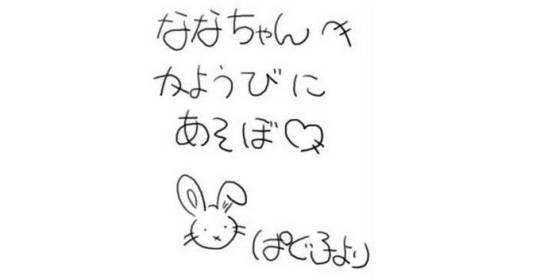
(a stylistic example)
Yamamoto takes him to task next meeting.
(continued under the cut)
"I know you're still learning the job Zaraki, but you can't foist your paperwork off on Miss Kusajishi." Yamamoto growls.
"I... Didn't? What?" Zaraki looks extremely confused, but the Captain-General is not fooled.
"You mean to tell me THIS is your handwriting?" Yamamoto snaps, throwing the report on the table, sheets spilling out as it slid down the length of it, so everyone could see the bizarre cutesy hand it was written in.
Zaraki's face darkened, jaw clenched. "Yeah. What about it? You goin' blind as well as senile?" He growled.
"THIS IS THE HANDWRITING OF A LITTLE GIRL, ZARAKI, DO YOU HAVE THE SAME HANDWRITING AS YOUR DAUGHTER?" Yamamoto slammed his hand on the table, temperature sharply increasing around him.
Zaraki began to arch his back and crackle with Reiatsu as well, but was stopped by loud ringing chime and a hand on his arm.
Yamamoto blinked in surprise to see Tousen, of all people , holding the giant back. There was a click as Tousen fully re-sheathed his sword. Suzumushi's chime wouldn't effect either of them, but it redirected their attention very effectively.
"My apologies, Yamamoto-sama." He bowed his head before turning his ear up at Zaraki. "Kakiyo wrote about this to me. You could only afford for one of you to receive schooling, right?"
Zaraki huffed and shook himself before answering. "Yeah, I was a broke-ass bastard before this." He grumbled, scratching his neck in a de-escalation feature. "Yer sister was a fuckin' saint and a genius. Neither of you have any business tellin' the whole world though."
"I think it was an exceptionally brave and difficult thing you did." Tousen shrugged. "Even when she used that method, less than one in a hundred parents actually stuck to it, much less achieved what you have."
Zaraki started looking everywhere but at Tousen, thinking. "... wouldn't call it brave, it was just makin' sure she was doin' good in school." He muttered.
Tousen kept listening intently at Zaraki. May I tell Yamamoto-sama so he doesn't cause another scene?"
"You're going to tell me what you're muttering about whether you like it or not." Yamamoto menaced.
"My sister taught Zaraki-taicho and Miss Kusajishi how to read and write." Kaname sighed and took off his goggles to rub the bridge of his nose. "It's extremely common in the Rukongai to have to teach children whose parents have never had any kind of schooling. Many of the parents would like to go to school too, but can only afford to send their children- actually , usually only one child. It's not usually an issue of money, but time- the parents can't afford to miss fishing season, or spare any siblings because they're needed on the farm. But, when you have a parent who is as attentive and caring as Zaraki-"
"Tttch!" Zaraki huffed at Kaname, who pointedly ignored him.
"-You can get around the schooling fees and scheduling problems by telling the student that their homework is to teach their parents what they learned in school that day. The homework you give the students is for their parents to do after they pass the lesson on and grade them on how well they taught their family." Kaname explained, putting his goggles back on. "Kakiyo was in awe of Miss Kusajishi's dedication to teaching you, and immensely proud of your efforts."
Zaraki still refused to look at Tousen, but his ears were bright red.
"...ohhh." Ukitake realized. "Wow, that's... I thought it was impossible to learn how after a certain age, that's - well, I don't think it's something I could have done!"
"What?" Glared Yamamoto.
"Zaraki-taicho and Miss Kusajishi have the same handwriting because he learned how to read and write by learning her school lessons from her." Unohana translated. "-An exceptionally difficult way to learn, and commendable for even trying." She continued, arching an eyebrow at him as a warning.
"Yeah and with all due respect Yama-ji? You're not exactly in a position to be complaining about anyone else's handwriting-" added Shunsui. "Zaraki's handwriting is odd, but it's perfectly legible. Nanao-chan framed your last memo because she thought it was an abstract painting."
Yamamoto turned to Shunsui with an aggravated glare.
"I'm afraid I have to second Kyoraku-taicho." Tousen said, without an ounce of chagrin in his voice. "The kido spell on my glasses can translate nearly everyone's hand, but the only person in the ninth who can read your memos to me is third-seat Maegawa, and mostly because she's had several centuries practice."
"Wait, we were supposed to be getting memos?" Mayuri squawked. "Dammit! I thought that squiggly garbage was the fax machine breaking every other week! I disassembled that thing three times trying to fix it!"
"You can all shut up now." Yamamoto snarled, and everyone did, but there were still a lot of pointed looks around the table, and Unohana's eyebrow had not resumed it's usual curvature yet. "Please consider my complaint withdrawn."
Unohana's eyebrow arched further and she cracked her eye open to reveal a coal-black iris, going from Warning to Threat.
"...My apologies, Zaraki-taicho. That was. Inconsiderate of me." Yamamoto muttered.
"Ya gonna shut up about it now?" Zaraki asked, not quite facing Yamamoto, but back still arched.
"I will hold my judgment in check in the future." Yamamoto acquiesced, watching him.
"Sure." Zaraki grunted, shaking his shoulders to drop the subject. "Right, what the fuck were we doing?" He asked, returning to the agenda.
---
After the meeting, Tousen took a minute to stand in the late afternoon sun, exhaling and releasing the tension of the day, when someone grabbed one shoulder and plopped something heavy on the other.
"Yeh didn't have to do that." Zaraki grunted just behind Tousen's ear, his forehead resting on the small man's shoulder, half gratitude, half grumble.
"One of the responsibilities of a captain is to keep the general in check, and I had a particularly good opening to stop that nonsense for good." Kaname hummed, hand reflexively coming up to touch the giant's head on his shoulder, fingertips tracing over the scarred visage and peculiar hairstyle.
"Didn't read that in the employee handbook." Zaraki grunted, grin in his voice.
"Yamamoto wrote those handbooks, and he'd rather we let him do as he pleases. You have to learn how to read between the lines, Zaraki." Kaname teased.
Zaraki gave his strange, low clicking chuckle of amusement and affectionately mock-bit Kaname's ear before standing up, still holding his other shoulder.
"...Thanks. " he muttered, giving his arm a squeeze and stepping away. "Gotta go pick up Sensei, you talk to her if you think I need more tutoring!" Zaraki waved, striding off to collect Yachiru in completely the opposite direction from her school.
"ITS THE OTHER- oh, he'll figure it out." Kaname sighed.
The sun was low in the sky, but it was still warm, and the first Cricket of summer started chirping, startling him. Suzumushi chirped with it, singing her mournful loss of her original wielder, but not so despairing this time.
"Kaname?" Sajin asked, heard before he was felt as usual. The lieutenant's meeting must have wrapped up late.
Kaname smiled and put a finger up, indicating he should listen. Sajin did, helmet tipping slightly to hear.
"Crickets!" Sajin realized, and offered Kaname his gauntlets hand to lead him home. "...I miss Kakiyo too." He sighed.
"You're not really gone if some part of you lives on in someone else." Kaname hummed. "I realized she is not so far gone today."
"Oh?" Sajin asked. "Where does she live on?"
"Have you read any of Zaraki-taocho's reports yet?" Kaname grinned. "His hand is not his hand alone."
#Bleach#Bleach Fanfic#AEIWAM#an elephant is warm and mushy#kenpachi zaraki#kaname tosen#kaname tousen#genryusai shigekuni yamamoto#long post under the cut#its cute
253 notes
·
View notes
Note
hi, i had a medium to big question. in your post about the adhd self-help book you mentioned people with adhd being conditioned to be nonconfrontational, but i've never once in my entire life connected the two? can you break down the connection for me so that i can once again (this week, even) have my understanding of my own condition blown wide open?
So, you are not the only person to ask about this, but that's on me for being unclear -- I wasn't trying to assert that kids with ADHD are automatically conditioned to be nonconfrontational, I was more trying to be like "Hey not everyone needs lessons in medical self-advocacy but a lot of nonconfrontational people do." And I think there is a higher population of people with neurodivergence who are deeply confrontation-averse, but I don't have like, numbers for that, it's just an assumption based on other knowledge.
It gets complicated; ADHD is a disease based heavily in acting impulsively against your best interests. But yeah I do think people with ADHD are often conditioned to avoid confrontation because of two main factors: rejection-sensitive dysphoria and executive dysfunction.
RSD, which I hate perhaps more than any other symptom or behavior associated with ADHD, automatically kicks our nervous system into high gear in social situations and encodes embarrassing moments in our memory with high-def clarity. Because RSD naturally causes a level of anxiety around socialization, it tends to make us nonconfrontational simply because a) we don't want to be yelled at, b) we don't want to embarrass ourselves by getting emotional about something that may not warrant it, and c) by the time we realize what's happening our body is already on high alert which means we are likely to go into fight-flight-freeze mode.
Me, I freeze, usually, but none of those three options are great for fast thinking during an argument. I used to lose arguments a lot simply because I couldn't think or react as fast as the neurotypical person I was fighting with, so I simply stopped having fights. Notably, I did not have this problem when fighting with my brother, who is also neurodivergent and has many of the same freeze reactions I do.
If people disagree with me, even when I know I'm right I also know I probably won't be able to vocalize it properly, so I back down. Usually it's trivial so it doesn't matter, and I've gotten strategic about how and when I argue about things that do matter; it's also a lot easier to do with strangers or professionals (like doctors) where I don't have to worry about long-term social repercussions. But yeah, our own nervous system tells us "hey maybe don't pick this fight" about every single fight and if we do pick that fight, it treats our opponent as a dangerous predator.
Executive dysfunction's interaction with nonconfrontation is something I have less problem with because while I do have poor executive function, I've spent a lot of time and energy training myself to cover the Important Stuff. I have mild ADHD so I'm capable of this; I'm not trying to say everyone with ADHD is, because lord knows it's exhausting for me and I've been doing it for roughly thirty years. But essentially, I cover where it counts: if someone needs me to do something I do it, I meet deadlines, I pay bills.
So with that disclaimer in place, a very common issue especially for children with undiagnosed ADHD is that they'll be told or asked to do something and simply be unable to begin or complete it, then when they're asked why they didn't do it they can't explain. Even if they try to explain that they simply couldn't, like they were incapable of doing it for reasons they don't understand, that usually doesn't hold water with a lot of parents and teachers.
"I couldn't bring myself to write this essay," is actually something I told myself a few times in college, but it's not something I'd bother trying to tell someone else, because if you think you're neurotypical that sounds very insane. So I'd lie and say I forgot, or I'd take the fail, or I'd simply drop out of the class. Crucially I would not fight with the authority figure who was questioning me about it, because I knew I wouldn't be able to explain myself, and I'd just end up getting in more trouble for longer.
Our culture is structured for neurotypicals, and it's not even structured for all neurotypicals. Behavior that deviates from Approved Neurotypical even when you think you are Approved Neurotypical is highly punishable. So if your options are passivity, even when passivity leads to pain, or confrontation, most people who aren't Approved Neurotypical will opt for passivity once they've had a taste of where confrontation leads. I know I do.
And the thing is, there's nothing actually wrong with that. It's a strategy calculated to minimize pain. Even when I'm firing on all cylinders on a fresh dose of Adderall, I still generally let fights go unless there will be actual real consequences, because it's just not worth it. But knowing we have ADHD and knowing we fall into this pattern, I think it is good to be aware that sometimes letting a fight go is really going to fuck you, and at that point even being bad at it is better than not engaging.
I'm pretty good at calculating those, but it's a lifelong process, knowing which hills to die on when you assume you will automatically die if you ever get above sea level.
346 notes
·
View notes
Text
While the source material clearly intends Xue Yang to be read as an orphan (perhaps orphaned so young he has no memory of his parents), I think it’s underexplored in fandom that he never ACTUALLY SAYS that his parents DIED, but rather that he was a child without parents.
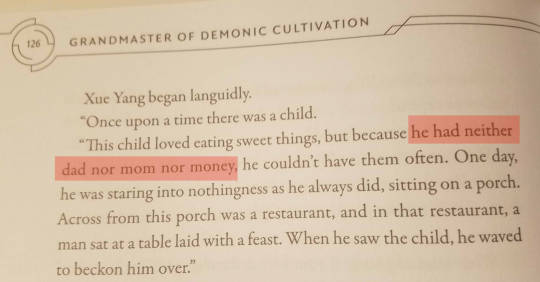
"He had neither dad nor mom nor money" (via the official english translation)
I think there's something in here worth exploring about the possibility that Xue Yang was abandoned by his parents.
Perhaps he remembers one or both of them and/or the event, perhaps he does not but just has a sense of it having happened, perhaps he has no memories of it at all but it still psychologically impacted his development.
Just about every character in the story can be better understood by looking at how they were raised, and Xue Yang is CERTAINLY not an exception.
There are myriad ways to interpret his childhood (though none of them stable, safe, or cared for), but I have been thinking a LOT lately about how being abandoned by his parents could have shaped him into who he later became.
His behavior in the Villainous Friends extra (wherein he, seemingly arbitrarily, breaks things and antagonizes people and then specifically challenges Jin Guangyao about paying for damages) COULD be interpreted as acting out in a way that's common for children and teens with a history of abandonment who are testing the waters of just how much their new guardian/s will tolerate. This sort of behavior can be a self fulfilling prophesy as well as an attempt to prove to themselves that their expectations of rejection or punishment are correct.
If Xue Yang has only ever known the world to be a painful place where people reject and abandon him, then that's how he expects the world to continue behaving. If suddenly someone defies this expectation, it is simultaneously a fascinating and wondrous thing, and also a threat to his worldview. After all, if THIS person can be kind and care for him, then why didn't anyone else?
If JGY, who at this point is essentially just his handler, can be unconditionally patient with him... then why couldn't others have been patient with him over much less? And why couldn't his own parents, who had considerably higher responsibility to him, be as patient as JGY?
It's much easier to push and push and push until you break the patience and prove your cynicism correct, than it is to grapple with those painful questions. And after all, Jin Guangyao had an exterior force (Jin Guangshan) requiring him to show patience. And once that force was removed, so was Xue Yang. This, perhaps, felt as much like validation as it did betrayal.
There might be a parallel to be made here, too, about how JGY was and felt betrayed/abandoned by his father. This in common might be something that they bonded over.
And of course, as always, there's Yi City.
Xue Yang expects Xiao Xingchen to abandon him, and his elaborate “revenge” was at least in part in preparation for that anticipated betrayal. He "knows" he will be betrayed and, perhaps unlike what happened with Jin Guangyao, he intends to be ready for it this time. Ready to punish Xiao Xingchen the MOMENT it happens, or ready to convince him not to betray him after all (what is "We're not so different, I'm not uniquely evil, you're ending our life together because you think you're better than me but look! Look! You and I are the same now" if not a deeply misguided and utterly desperate plea?).
At some point he starts hoping it just won't happen, and stops needing the “revenge” plot. When it starts unraveling before him, he tries for understanding first. What is "Hear my story, THEN decide--" if not begging to be understood?
Of course it doesn't work.
Xiao Xingchen doesn't even kill Xue Yang, either; he goes Away. Goes where Xue Yang can't. If Xue Yang is read as having this particular trigger, Xiao Xingchen's suicide may feel like abandonment all over again.
Perhaps Xiao Xingchen NOT killing Xue Yang becomes a parallel to Xue Yang's parents abandoning him to suffer alone instead of keeping him or killing him. Or else maybe Xue Yang's mother DID try to kill him (drown him or left him out in the cold) and he just managed to survive, in which case Xiao Xingchen NOT trying to kill Xue Yang puts him a cut above even Xue Yang's own mother/parents.
Final thought:
While I find Xue Yang's lack of familial connection to the rest of the cast compelling, I also find "what if" scenarios fascinating to explore, and "Xue Yang was abandoned by parents who might still be around during the story" does create some fascinating opportunities for fic.
Such as:
What if Xue Yang was yet another illegitimate son of Jin Guangshan? What if he knew but Jin Guangyao didn't? What if Jin Guangyao knew but Xue Yang didn't? What if Jin Guangshan himself knew? That would really put the insistent protections into a very weird light (is there a heart in there? Or did he think he could string Xue Yang along like he did Jin Guangyao? Or was Xue Yang blackmailing him?)
OR
What if Xue Yang was the illegitimate son of Chang Cian? It certainly puts a spin on that entire scenario. Little Xue Yang has another reason to want to please this man, and a further reason to feel betrayed by the abuse. Chang Cian not even recognizing him. Xue Yang taking revenge on the entire family because they ALL wronged him in a way he can't articulate. Because they got to live the life he could have if he'd been wanted.
Certainly none of this is canon, but it's not TERRIBLY far beyond the bounds of canon either, and makes for some juicy food for fic.
#Mdzs#mo dao zu shi#grandmaster of demonic cultivation#the grandmaster of diabolism#Yi city#Xue yang#mdzs meta#yi cheng#xue chengmei#xuexiao
418 notes
·
View notes
Text
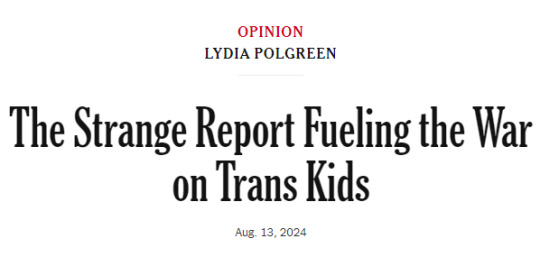
While maintaining that “for some, the best outcome will be transition,” it nevertheless effectively recommended that the N.H.S. abandon the guidelines embraced by major mainstream medical associations and restrict the use of medications that have been offered for decades to adolescents across the globe with vanishingly few negative side effects or regrets.
The reason, the report says, is that these treatments are insufficiently supported by reliable, long-term evidence. Then, remarkably, the report recommends treatments — psychological treatment and medications for depression and anxiety — that have even less proof behind them in helping children (or adults) with gender dysphoria, though they may help with other mental health issues, and many children with dysphoria already get these treatments. And for all its insistence of evidence, the report is peppered with mere speculation about the potential causes of gender dysphoria: pornography and the phenomenon of social contagion are invoked, with zero credible evidence to support them.
It is a strange document.
Social conservatives welcomed the report. But it has also been heralded in some liberal quarters in Britain, where even the Labour Party has supported its conclusions, and around the world as a model of open-minded rationalism, of well-intentioned — progressive, even — unbiased scientific inquiry attempting to provide information in young people’s best interests. This, they declare, is what following the science and the evidence looks like.
But is it? In an effort to evaluate the Cass report’s findings and recommendations, I spent the months since it was released poring over the document, researching the history of transgender medicine and interviewing experts in gender-affirming care as well as epidemiologists and research scientists about the role of scientific evidence in determining care standards. What I have come to realize is that this report, for all its claims of impartiality, is fundamentally a subjective, political document.
[...]
A great deal of the media coverage of gender-affirming care in the West has painted a picture of huge numbers of children, some of them suffering from profound mental illness, rushed into medical transition, practically force-fed puberty blockers and hormones, then fast-tracked to surgery once they turned 18, based on unproven treatment and perhaps bogus science.
But the report itself not only fails to show any evidence of significant regret among patients or other forms of harm; its own data also contradicts the notion of rushed transition. Of the more than 3,300 medical records examined as part of the review, about a quarter of children and adolescents were referred to an endocrinologist, which suggests a significant screening process. Indeed, on average, patients had more than a half dozen consultations before being referred.
If anything, the evidence suggests a lack of care bordering on neglect, which is not surprising considering that millions of people are on waiting lists for treatment of all kinds by Britain’s crumbling health system. One of the most common pieces of feedback was that young people lingered on waiting lists, sometimes for years. A number of participants in focus groups convened for the purpose of the report said they felt that they had to “prove” to clinicians that they were transgender.
[...]
At one point the report posits that because a child has never had the experience of growing up in their assigned sex, they would have no way to know whether they might regret transition. “They may have had a different outcome without medical intervention and would not have needed to take lifelong hormones,” the report says, referring to children assigned female at birth.
It is hard to know what to make of a statement like that. A person gets only one life; waiting to see how it works out isn’t really an option. To a queer woman like me, this is an ominous echo of something many of us have heard many times in our lives: Maybe you just haven’t met the right man yet. The wish — whether expressed by a parent, a teacher, a therapist or a suitor — is a wish for a child not to be queer.
It is hard to find a satisfying explanation for these kinds of conjectures and conclusions in the report other than this one: Many people find transgender people at best unsettling and possibly deluded or mentally ill, or at worst immoral and unnatural. They appear to believe it would be better not to be trans.
As much as Cass’s report insists that all lives — trans lives, cis lives, nonbinary lives — have equal value, taken in full it seems to have a clear, paramount goal: making living life in the sex you are assigned at birth as attractive and likely as possible. Whether Cass wants to acknowledge it or not, that is a value judgment: It is better to learn to live with your assigned sex than try to change it. If this is what Cass personally believes is right, fair enough. It can charitably be called a cultural, political or religious belief. But it is not a medical or scientific judgment.
13 Aug 2024 | Link
110 notes
·
View notes
Text
“The Blacks won because it’s Rhaenyra’s bloodline that continues on.”
Ok, first of all, Aegon II made Aegon III his heir. Rhaenyra was dragon chow by then. Rhaenyra wanted the iron throne more than anything else, and she only held power for 6 months before the small folk had enough of her bullshit. Six months. She managed to rule for half a year before she was overthrown, not by a usurper, but by her own people. Clearly, not a good ruler if you can’t even make it a year without getting chased out of your castle.
Second, Rhaenyra’s bloodline managed to fumble the ball two feet from the finish line. It started with Aegon the Unworthy and it ended with the mad king being overthrown just before the long night. Just one more generation was all they needed to last, and they fucked everything up so bad it put the entire world of men at risk. That… that takes skill. You have to actively TRY to fuck up that much.
After the conquest, there was noted to be one “good” king, and that was Jaehaerys. Between conquest and dance, Jaehaerys was noted as being a good, wise king. Aenys managed to have a mob trap his oldest two children in a distant castle right before he died. Then Maegor stepped in. He may have been decent if it weren’t for the brain damage. Most of the things he did before the battle on the hill were either rumors or just not that bad. He was also very against Kinslaying. Imo, one of the worst things he did was punish everyone involved in the Kinslaying in The Eyrie. Seems kind of strange he would dole out such a harsh punishment only to then kill his nephew in a very one sided dragon battle. That was the first thing he did after he woke up, though. Considering he had such a drastic change in personality, we can’t say how his rule would have been otherwise.
After Maegor’s death, Jaehaerys steps in. You know what made him a good, worthy king? Not the fact that he was a male, or could fight, or held the bloodline, or even that he rode the bronze fury. It was because he listened to the council of his queen. Alysanne was the real MVP of his reign. She did more for women’s rights than any other queen. She listened to her people. That is the mark of a good ruler. Walk softly, but carry a big stick. Know when to speak and when to listen.
People who know they have power and control don’t need to constantly remind others. They know. It’s not necessary to maim or murder people for speaking the truth, yet Viserys and Rhaenyra do just that.
When Saera majorly fucked up, they handled it. Not the way Alysanne wanted, by the way. She was sent to apprentice with the Silent Sisters just for sleeping with men while not married. Yet Rhaenyra can have 3 obvious bastards, insult the house with the largest naval force and prove to the entire kingdom that her words mean nothing, and Viserys still declares anyone who calls the strong boys bastards would lose their tongue.
Sorry, what? The Valaryons are one of the richest houses in the realm. They control most of the naval fleet. Maybe don’t make their son a cuckold?
“They had an open marriage!”
NO ONE ELSE KNOWS THAT. To the court and the small folk, Rhaenyra promised to be faithful to Laenor in front of the eyes of the gods, and she very obviously didn’t keep that vow. Why should they trust anything she says as Queen if she can’t even do something as simple as not birthing bastards? That’s what most people don’t realize in the bastard debate.
Whether you can prove it or not, the strong boys don’t look like either of their alleged parents. Like, at all. Even Aegon’s drunk ass could tell shit didn’t add up. Commoners are not going to be any different. They are going to know, and whether they can say it or not, it will still affect how they feel towards her. Can’t keep your marriage vows, why should I believe that you have my best interest at heart?
Because she doesn’t. She is a horrible ruler that lasted less than a year before the small folk rose up and drove her out. She feasted while they starved. It’s that self centered mentality that taints the bloodline and leads to The Unworthy.
Clearly no one learned about not having bastards, and this mofo decided to legitimize them on his death bed. Wasn’t going to be his problem, now was it? He died, someone else has to clean up his mess.
Hmm, not knowing how to clean up your own bastard mess, sounds familiar… oh, like Rhaenyra forcing her father to crawl from his death bed to make sure no one said mean (and true) things about her.
So I’m sorry, what were people saying about her being a good ruler? ‘Cause everywhere I look, I see another reason she should not have ascended the throne.
186 notes
·
View notes
Text
BG3 Drow Lore 🕷️ Minthara's Childhood
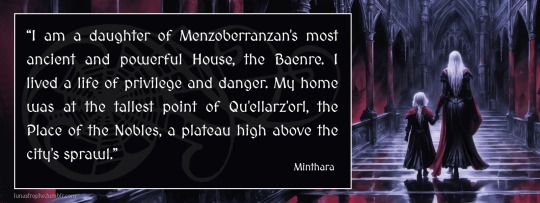
Some thoughts on Minthy's childhood in Menzoberranzan:
🕷️ Assassination Attempt – being almost killed was likely among Minthara's earliest memories: I survived my first assassination attempt while I still suckled at my mother's breast. I tasted her blood that day. She covered my body with her own, and a blade bit deep into her chest, almost puncturing her heart.
We do not know why somebody wanted to kill her - the assassination might be orchestrated by some relative, for example, or some other person who wanted to weaken her mother's position in the family. Minthara was likely important to her (see this post).
🕷️Lessons of Early Childhood – Minthara was being raised by her mother instead of being fostered to some other relative, like it happens with less important drow children: My mother taught me to talk, to walk, and then to kill. I still hope to thank her by teaching her how to die one day. In another line, Minthara says: I had every advantage, and my mother showed me how to survive.
As a female and Baenre, Minthara was infinitely more privileged than many other drow kids in Menzoberranzan – at the same time, though, she lived under enormous pressure, striving to meet her mother's high expectations. A failure meant a punishment, and little Minthara probably quickly learnt that in her world, failures can be deadly.
🕷️ Lessons In Killing? – Minthara most likely started to learn how to survive the perils of Lolth-sworn drow society when she was still very young.
It is quite possible that she scored her first kill before actually reaching adulthood – in one of her lines, when she is asked at what age it is right to set a child upon mortal combat, she answers: The moment it can hold a blade. It may even test its resilience against some common poisons while it is still in the womb.
We do not know if her own mother was building up her resistance to poisons in such a way, but in another line, Minthara says: my mother would have poisoned her own milk to torment me. So... who knows.
🕷️ Protected And Tormented – Minthara says that there was no love between her and her mother. As an adult, she reflects that her mother protected her with one hand and tormented her with the other, and admits that her relationship with her ...may not be the best model to follow.
🕷️ End of Early Childhood – in noble drow families, sons typically start to serve the household when they are around ten years old and when they are sixteen, they are officially recognized as members of their house. During the family meeting in the chapel, they receive the house piwafwi and then their mother - or matron mother of their house - makes decisions about their education and future.
I doubt that daughters of noble drow families need to serve the household as children - but maybe after reaching a suitable age, they start to visit the family chapel, for example, to observe and learn basic duties of priestesses? In case of Minthara, it would probably mean spending some time in the huge, domed chapel of House Baenre.
🕷️ Young Baenre - noble drow girls probably have their own variant of societal rite of passage around their sixteenth birthday, celebrated more grandly than that of noble drow boys. Maybe it is also a formal ceremony in the family chapel, followed by less formal celebrations - maybe even a party? Some drow version of "sweet sixteen"?
If yes - then most likely during this ceremony it was officially announced that Minthara is to be trained as a soldier in Lolth's service. It was probably one of the most important moments in her life, especially since noble females are typically trained to be priestesses - if they want to pursue a different career, they need their matron mother's permission. House Baenre apparently recognized Minthara's talents early.
Minthara's early training lasted for several decades - until she enrolled into academy.
For more of my drow lore ramblings, feel free to check my pinned post 🕷️
#minthara#minthara baenre#drow#drow lore#dnd lore#lolth sworn drow#dark elves#drow culture#for BG3 fanfic writers
92 notes
·
View notes
Text
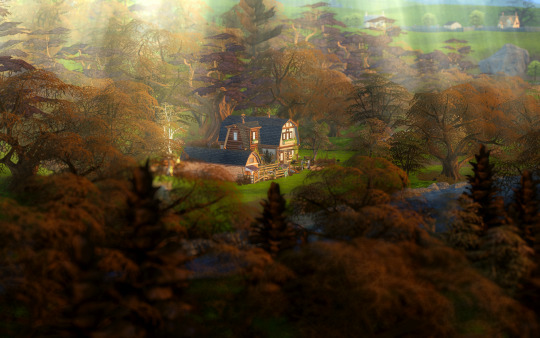




Dearest Zelda,
First let me say what a joy it was to receive your latest letter! Truly I was so delighted upon seeing it in the mailbox that I ran straight for Isaiah. He is not one to worry, but when our latest contact to the address we had for you in New Orleans once again went unanswered, I fear even he had begun to grow concerned.
I am delighted to read that your silence was not without good reason, and to see the wedding portrait you sent of you and Antoine as well as the photo of your daughter. How she has grown since we last saw her! She is not much younger than our eldest now, who I fear every day is so like your brother there is simply no one thing in this world that can tame her.
It does sound like your Violette is much the same, and how much joy it brings me to think that perhaps it is Florence’s spirit manifesting through them.
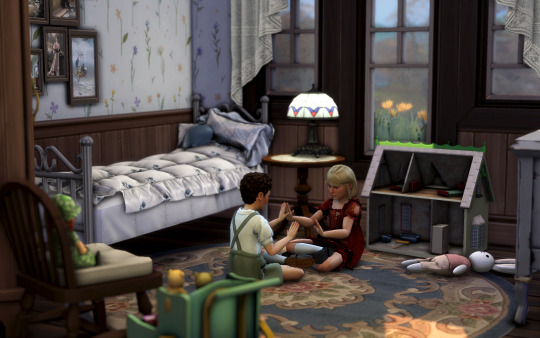



Our youngest have also begun to grow like weeds, much to my chagrin. Does it ever seem like sometimes you awaken and it’s as though the grass has grown a foot overnight? That is oft how I feel looking at them, and Rosalie seems to desire all the independence of her namesake.
She wasn’t but a day over six when she began poking into Rosella’s old room, curiously pulling forth toys and books from the gathered dust like a miniature treasure hunter. Truthfully, I could not tell you why your brother and I had yet to bring the room back into the light of day. Once you took the portrait from it it was like a pall had lifted, but I feared that stirring it would upset your brother’s long-standing grief over your mother, so I daren’t say a word.
But as children often do, Rosalie saw little of that other than a space to call her own, and we have now finally found the heart through her to give it a new life. I do hope your sister would love to see her in there, playing dolls and writing grand romantic stories for them aloud to her ever attentive twin. It is a joy to see them rediscover the beauty in the world that pain often hides, is it not?
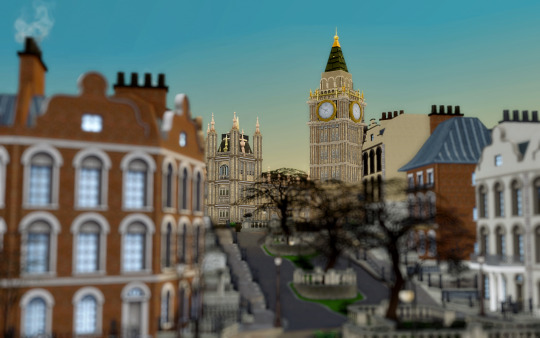

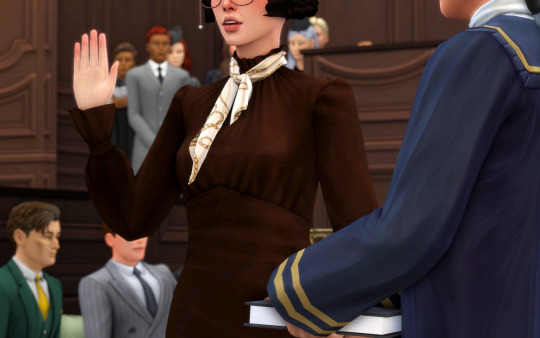
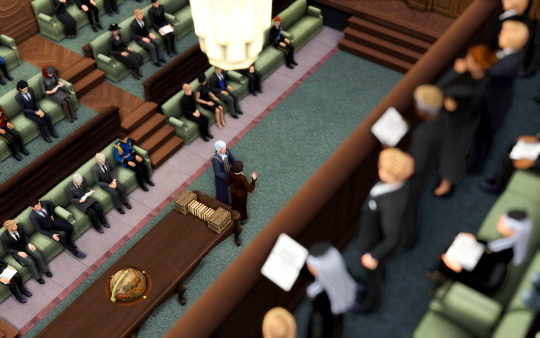
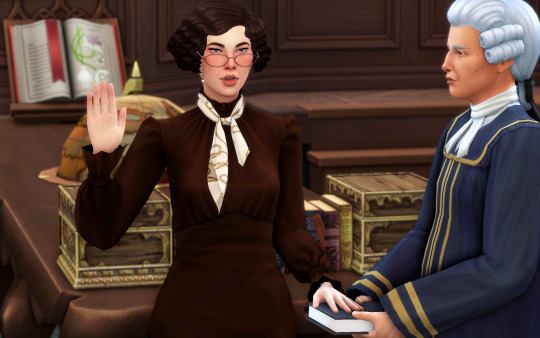
Have you written to Virginia as well? I fear she may not be quite as conscious of the time that has gone by. With the dissolution of The Women’s Political and Social Union, her work has turned increasingly to involvement with the Women’s Labor League, eventually coming to the attention of the Labor Party themselves.
I will admit that I am not as informed on the goings on of London as I perhaps should be, but even still it came as no surprise when the party nominated her as their candidate for Member of Parliament. As she so painstakingly explained it, the party itself has suffered great losses from their prominence in the 20s, what with the general bias of their associations with the communists and their seeming inability to stop the rampant unemployment that has taken hold even here.
I suppose she is fully aware that this was the cause for her nomination, as she was able to run more on the merit of her charitable associations than the negative reputation the party has recently taken on. Yet if she was surprised that this platform worked, she has never let on; but her work in the House of Commons has all but taken over her life since her election in 1931. How I do miss her and Wally, but that doesn’t stop me from wishing that she keeps her seat in the upcoming election of ‘35, even if it means we will see less of them than ever.



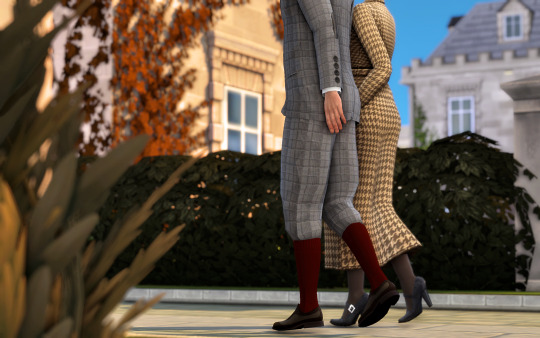
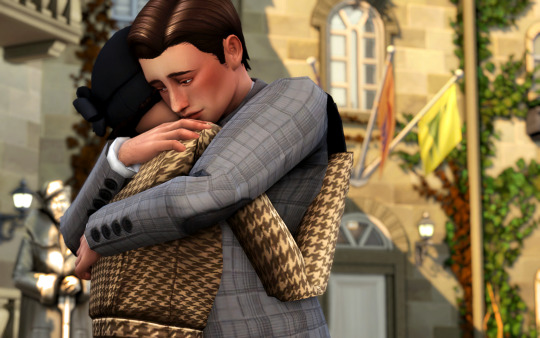
I imagine that what little free time she has is now spent nearby at Oxford, where Wally was accepted upon his graduation from secondary school. While I’m sure being the son of a governing member of parliament was not a mark against him, I have no doubt he was accepted there on the merits of his intelligence alone. Even from the small amount of time he spent here in his teen years, it was clear to me what a bright boy he was.
I am told he is majoring in physics there, a field that even in the briefest explanations Virginia has given me is quite beyond my comprehension. I suppose what else are we to expect with Virginia as his mother? I’m sure he’s had but the most informative, intellectual upbringing, even when it must have been colored by the high expectations that I can only imagine your sister set for him.
Despite her near constant work and best attempts to shield her vulnerability, there are moments when we speak and it seems as though Wally's departure brought forth much of the buried sentimentality within her. I suppose under it all she is but a mother like us all, proud of her child and yet sorrowful as his life grows beyond her own.
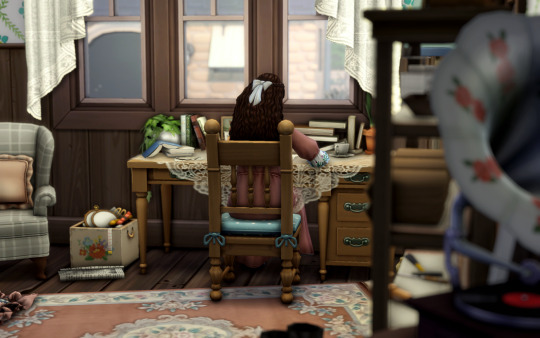

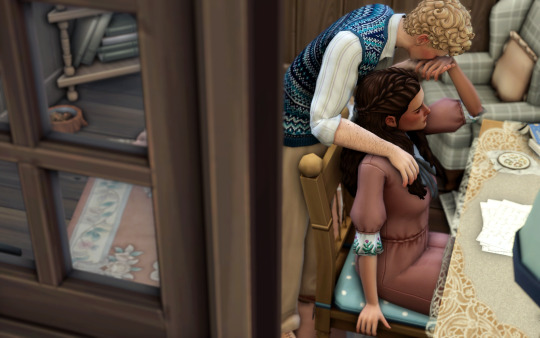

Before I sign off your brother has instructed me to ask you to include the most minute of details regarding your predicaments with the soil in your next letter. He has also asked me to attach a veritable field guide of advice, although I have told him that everything you have written points to the fact that you are in waters we could not navigate any better even if we tried.
I must admit that when I hear the word soil I think simply of the ground beneath verdant green grasses or darkened Bramblewood canopies. It makes me realize just how little of the world I have seen, but also how lucky we have been even in the throes of what seem to be such tumultuous times. I can only hope that such good fortune will last in England for many years to come, and that some of our knowledge may bring success to your efforts as well.
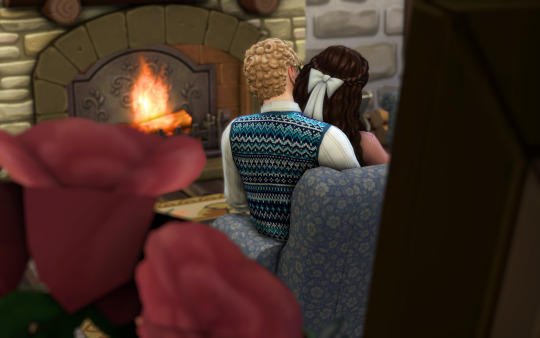
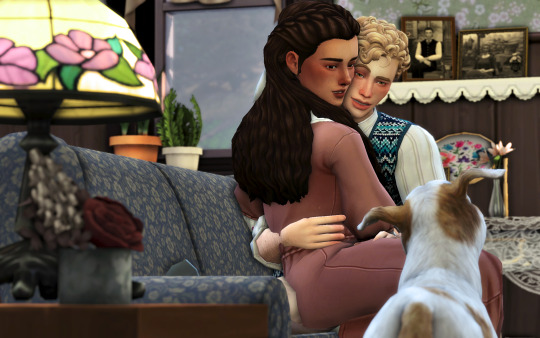
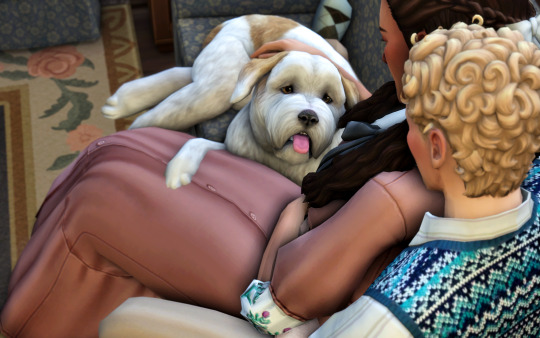



I must once again thank you for the photo of you and Antoine on your wedding day. We’ve placed it in our living room next to the photo of your mother and father when they were wed, as seems only right. In return I have also included a photo of all of us when we were last together to visit Wally’s new home in Oxford; although I’ll be the first to admit I do hope we spend the next high holiday together in Henford instead. Anything that close to London makes me long for the forest more than anything else.
Your mother once told me that she sent you every photo we took, and that you have been collecting them over the years. I hope this can make a welcome addition to such a tradition, and do always know that you are welcome here should you ever find need of solace in the place you once called home.
Your sister in marriage,
Summer Darlington
#1933#sims 4 historical#ts4 decades challenge#ts4 historical#sims 4 decades challenge#the darlingtons#sims 4 legacy#ts4 legacy#sims 4 story#ts4 story#summer darlington#Isaiah darlington#Annabelle darlington#Virginia darlington#Wally Webber#1930s
163 notes
·
View notes
Text

And if the devil... 1/10
Making a banner for this finally for the grand finale coming soon. Excuse to rb. Credit for the Aemond screencap goes to the wonderful Liv @barbieaemond Eventual smut, Aemond Targaryen x Maid!Reader
Chapter 2
Chapter 3
Chapter 4
Chapter 5
Chapter 6
Chapter 7
Chapter 8
Chapter 9
Chapter 10

“And if the devil was to ever see you, he’d kiss your eyes and repent.”
- Farouk Gouida
He’d had nothing but contempt for you the first time he’d seen you: a too tall, mannish girl mopping up baby vomit for Helaena with less tact and grace than a stable boy. He had seen the blotchy red and white of your hands and face and had thought you one of Aegon’s cruel jests for a sister-wife he did not deserve: a freakish chambermaid for a mad princess.
And far too familiar with a lady who was in every way your better.
He told himself it was not jealousy that burnt in the pit of his stomach, brighter and wilder than Vhagar’s fire. No. It was distaste and a healthy amount of distrust, he’d felt when he’d come to visit Helaena and found you rocking her gently in your arms. You’d been in drab servant red, hair escaping your work bonnet, so strangely pale that it had made Aemond squint in immediate suspicion. Whatever it was, you were no noble companion or even one of the prettier handmaidens, just a scullery girl, dress still stained from floor scrubbing, holding a Targaryen princess and gently brushing her hair out of the way.
He’d had to control the urge to snatch her from your arms and snarl at you to leave if you wanted to keep your head… It would not have been becoming. Helaena would no doubt have found it distressing. But most of all, he feared what he would do to you the moment he’d had your pale, sickly hand in his grip. Because you had robbed him of a thing which he had not known belonged to him. His right to his sister’s pain, always so far and yet so close, because he feared the things he could say if his affection were ever to escape him. And here you were, like a thief in the night, snatching his chance before he’d even known it existed.
You’d had the common sense to leave quickly with your bucket of slops, and your eyes fixed determinedly on the floor. As if you’d known your transgression.
Helaena was not half as wise as you. Her tears had been all but gone, not there for a brother to wipe away or avenge. No forthcoming confession about Aegon that he could use as an excuse to stalk his brother’s steps and pick a fight. Just her tongue loosened by the joy of Aemond’s sudden gentleness, brought on by unwarranted competition.
You’d been recently assigned to her quarters, she’d told him and you were very good at putting the children to sleep. You weren’t squeamish like the ladies of the court, would look at Helaena’s insects without problem and think nothing of her muttering under her breath, however strange her words might be. When the children were quiet, when Helaena herself hadn’t known what else to say, you had talked to her about the great locusts of the plains of Essos, told her stories of swarms of them, climbing atop the little babes, eating the grass so thoroughly no horse or cattle could survive on what was left.
But more so, you were kind and strong and willing to put the princess to bed when her head hurt so bad she could barely think. You stayed up with her when her dreams were more a punishment than reprieve from her reality, asleep in her bed besides her or waking up for her to tend to the babies. Not a wet nurse, but you had a good head on your shoulders for fussing and crying. She had come to depend on you really.
He had not liked it at all.
He’d blamed himself for being too engrossed in weapons training and Vhagar to have noticed your creeping, insidious influence on his sister. He’d questioned his mother and had found only her relief that at least Aegon left you alone, probably less out of kindness than out of distaste. You may have been coarse and rude and perhaps unfit to deal with anything but the lower floors of a castle, but the queen had had enough problems to deal with and at least you had a strong back and a mean glare that kept even princes away.
Not Aemond though.
He’d kept his good eye on you, and a new man-at-arms he trusted always at his sister’s side. Had even thought to corner you and put the fear of the gods in you lest you had thought Helaena alone and vulnerable. Had not even considered replacing your presence with his own, uneasy with how much the prospect thrilled him.
You’d looked up only once: a lightning quick glare for the One-Eyed Prince before the subservient mask was firmly back in place. And Aemond had been struck strangely silent by your odd red eyes and let you scurry away. Your coarse yellow hair had been escaping its thin bonnet and he’d known immediately.
Not Valyrian blood, not a misplaced bastard, not some political trick as he had suspected…
Albino.
Oh but Helaena did have quite a fondness for broken, repellent things.
He’d been less wary then, but no less watchful. He’d stopped to stare when he saw you carrying the princess’s tray or even one of her children up and down a corridor, infallible technique for getting them to sleep at last. He’d haunted his sister’s rooms, lurking in doorways, listening in to your accent (not Flea Bottom, but not court either, no one had taught you how to speak to your betters or even how to speak well at all, it seemed…) as you told Princess Helaena about having eleven cousins and wrestling them all into bed, about taking in laundry because you couldn’t take in sewing, about a crotchety old uncle who had broken his hip out at sea and needed minding now. An uncle who resented the minding and the niece and wife that kept him and his children fed. An uncle who sounded to Aemond’s hungry, savage loneliness a lot like a father and a king.
He does not hear the other talk, even if allowed to be present for it he would not consider it. He would have dismissed it as women talk, gossip, having seldom let himself dwell on kindness instead of grievance, succor instead of retaliation. He does not hear a beloved sister tell you to stay one step ahead of the dragon, as far away as you can manage, because dragons bring nothing but fire even if they love you, warm enough until it becomes death. She should know.
It does nothing to keep Aemond from following behind you. When you took the children and their mother down to the kitchens for hot milk with honey. When any of them were achy or colicky or cranky and you would put a shawl over them, babies or mother. When you insisted the princess and her children could do with a stroll and some sun, and Aemond found his heart aching with hideous envy because he could hear his sister laughing at your snappish kitchen talk, speaking softly and intimately to you, as hungry to give the attention as to receive it. (Even as his sorry, wicked heart screams out, it was mine, all this was meant for me, how dare you, how dare you take what I didn’t know I needed!) When you sang Helaena’s babies or Helaena herself to sleep and Aemond found he had to cover his ears against your strange, foreign crooning, that didn’t sound like King’s Landing but sounded treacherously like home. He’d had to flee to the training grounds and take out this all-consuming anger on something, drown out your husky, kind voice with the din of his sword against a shield. Hitting the wood over and over again until he tore it to splinters and Ser Criston had to hold him into stillness, knowing there was no comforting a dragon without getting burned.
“My prince.”
You would say when you fled a staircase he cornered you into.
“My prince.”
When you’d courtesy, clumsily, still too sour-faced and suspicious to do it gracefully, when he managed to catch you on your way out of Helaena’s room.
“My prince.”
The day he had decided that yes, your prince, was exactly what he’d be to you, what you’d say to him, in whatever way he’d manage to tear it from your throat, in spite of Aegon’s taunting and the visceral fear at his own woeful lack of knowledge in matters of the flesh.
Because he had decided if you had no problem taking from him, he would have no problem taking from you.
Because you’d said it to him on your way out of the washing court, bonnet gone and coarse yellow hair sticking out of your pinned braid like a frightful halo, a bright purple bruise already forming on your cheekbone, as you’d glared directly at him, challenge in your head held high, and the water splashed all across your linen apron, sticking to your skin so closely that Aemond should have had you right then and there.
Because you’d said it with a curt nod, like Ser Criston when he approved of a particularly good move Aemond had just learned in the training yard, like a general to a soldier, “My prince.”
Because he’d just seen you swing a chamber pot directly into a stable boy’s face after hearing him call Princess Helaena “daft,” bringing it swinging back to the other side of his face, contents and all, just to take a step back to bring a fist into the stable boy’s friend. Aemond had been too transfixed by the sight of your heaving chest and the splotchy red of your cheeks to intervene after you’d taken a half-hearted punch to the face, returned it in kind and thrown the now empty chamber pot at the whimpering serving boys at your feet.
“And clean up your bloody mess!” You’d said before washing your hands in the fountain and strolling out of the courtyard, about as triumphant and vicious as Prince Aemond himself had ever felt when defeating knight after knight, telling himself he was better, stronger, a more fit ruler than any of them would ever be.
“My prince,” you’d said with your curt, martial nod, with your ruby-red eyes and the split knuckles of your hand, wounds taken in the defense of Aemond’s sister, wounds that should have by right belonged to him.
He’d taken your wrist in his hand, grip monstrously strong, and watched you realize the mistake you had made in the proud tilt of your head. You had forgotten for a second that pride wasn’t for your class of people, less so when confronted by a prince of the realm. He’d watched you realize your danger and how you didn’t care, that if there was a price to pay for pride you might as well pay it… and had realized himself that he didn’t care much either. Because Aemond had decided in that moment that he liked the defiance and stubborn anger in your ruby-red gaze, just as much as he had liked the ringing din of the chamber pot breaking something in that stable boy’s face. The prince had smiled at you then, his hunting cat smile, the one men all over the Seven Kingdoms would learn to fear, as he let you pass. Your prince, you would call him again, he decided as he let you go. Your prince, he would hear you call him, on your knees, on your back and beneath him, anyway he could get you. Because he wanted it. Because he had known himself to be spoiling for a fight and would be spoiling for a fight his whole life, the moment he had gone looking for Vhagar, the largest living dragon in the world, and won her. As he would win you. On your knees, your back or beneath him, as you called him your prince, because you wanted to, not ripped out of you by fear and hope for profit but because you wanted him. He would teach you that. That there were none like him, Targaryen or otherwise. That he was your prince and more than. He would teach you this, just as he had begun to teach the world.
#aemond targaryen x you#aemond targaryen fanfiction#helaena targaryen#dothraki reader#eventual smut#hotd fanfic#and if the devil...
128 notes
·
View notes
Text
@nimblermortal sent me this last week:
A second blade weapon became increasingly common in the later Viking Age. It does not have a formal name, being often referred to as a fighting-knife or battle-knife, and it was essentially a development of the one-handed, long seax knife of the Migration Period. A single-edged blade with a thick back that added weight to a short, stabbing blow, it seems to have been intended as a back-up weapon. By the tenth century, battle-knives had elaborate scabbards that were worn horizontally along the belt, allowing them to be drawn across the body from behind a shield if the sword was gone; a variant hung down at an angle from an elaborate harness. It seems they may also have been worn on the back - again for a swift, over-the-shoulder draw.
Children of Ash and Elm by Neil Price
@petermorwood (Mr Morwood! Mr Morwood!) I found an archaeologist claiming people were doing over-the-shoulder draws! Would you care to weigh in?
*****
Would I ever! That's a button well pushed. But things got odd when I tried, because as soon as I'd written even the smallest reply and saved to Draft, this happened:
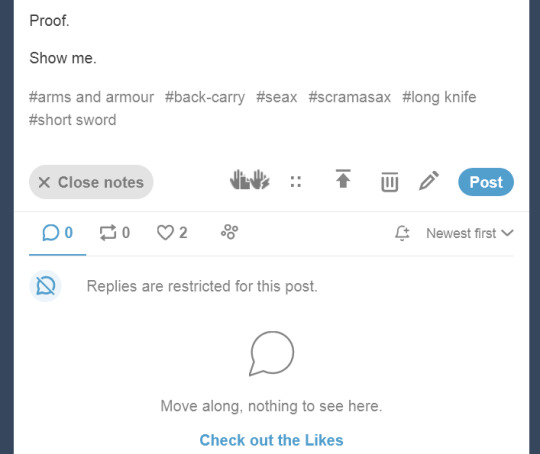
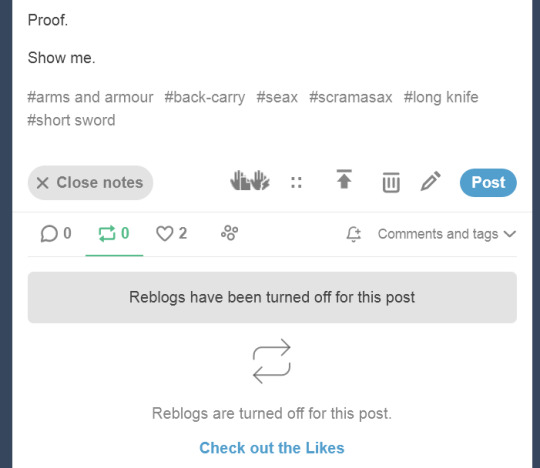
Letting it stand would have seemed like I was trying to avoid comments, corrections or criticism, but despite poking around in Settings there was no way to turn things on. It was only by cut-and-pasting @nimblermortal's entire original as a Quote starting a new post that the problem was resolved.
Anyone else encountered this?
Anyway, on with the lecture response. :->
*****
As regards Back-Carry / Back-Draw of "battle-knives", I'm not convinced.
("Battle-knife" is a term I've never seen in connection with any Viking Age weapon. What's the Old Norse for it? German "Kriegsmesser" (war-knife) refers to something much bigger from 500 years later, also not back-carried or back-drawn - which from here on will be BD / BC.)
To get where he is now, a full professor, Neil Price will have defended his PhD, and should know such a statement as "It seems they may..." will need evidence to support it.
That phrase is easy to write, as is "According to legend..." and "It is said..." However these are IMO default History Channel phrases, with all the authenticity that implies. None of them actually PROVE what they're speculating.
"Experiments conducted by museum staff wearing authentic armour reveal that IT SEEMS medieval knights could use smartphones."
But does it prove medieval knights USED smartphones? See what I mean?
*****
I first asked if anyone had actual proof of BC / BD on Netsword almost 30 years ago, and to date there's been nothing. I've also posted about it quite a lot on Tumblr, so being poked with this particular stick is no surprise. :->
The quotation from "Children of Ash and Elm" is the first time I've heard of a trained archaeologist making a claim for BC / BD, and the odd part is that Prof. Price also states the weapon was intended for "...a short, stabbing blow" - which means wearing it horizontally in front makes far more sense. From that position it can be drawn far faster and with less telegraphed intent than "...on the back - again for a swift, over-the-shoulder draw."
Reaching up for any weapon carried across the back, whether long or short, is a bigger movement - and thus less "swift" - than snatching out the same weapon worn at the hip or across the front at waist level, especially if - as he suggests - that move is masked behind a shield (or for that matter a cloak, a door, or a half-turned torso...)
Try both moves in front of a mirror with a ruler or even a length of dowel, and you'll understand.
With a weapon-hilt visible behind one shoulder or just a cross-belt suggesting something slung out of sight, what's a Norse warrior going to think when his potential opponent reaches up there? At a moment of hot words and high tension, will he wait while an itchy back gets scratched or until an attack happens?
The explosive violence described in sagas suggests not.
If Prof. Price has solid proof for his BC / BD notion in the form of artefacts or art - and it'll need more than a one-off example - I'll be very pleased to finally see some "show me" evidence.
(It won't do anything for longswords of 500 years later, of course, though I bet the uncritical back-carry brigade would leap on it regardless.)
But without that evidence, I'm taking "it seems" with a wary pinch of salt.
*****
There's a weird internet fixation about BC / BD (which are NOT the same thing) and an equally weird need to show that back-draw "works", whether with hooks under the guard and a leather condom at the point...
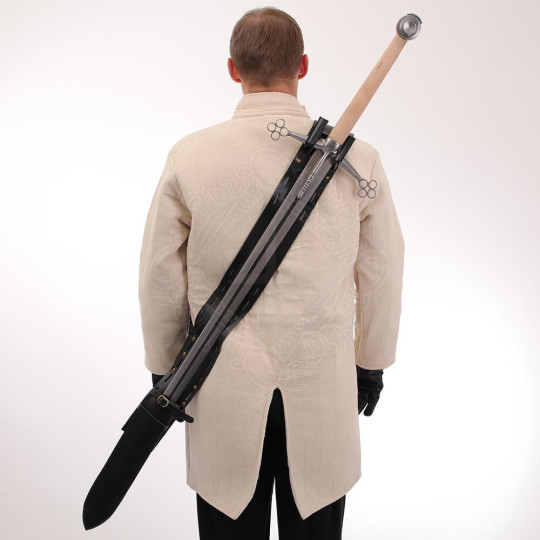
... or by being open most of the way down one side.
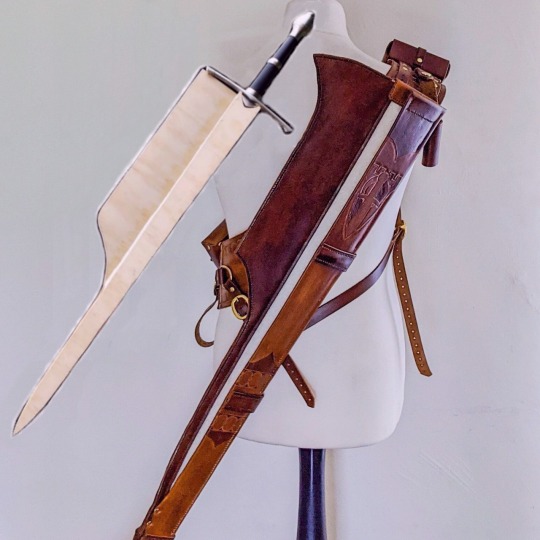
Neither are real-world historical, so let's see how they work in fantasy.
IMO they're not appropriate there either, because the designers are so eager to provide working BC / BD that they ignore the main function of a scabbard, which is to carry the weapon in something which protects people from the weapon's edges, and the weapon from the elements.
Real scabbards for real swords went to some trouble over that. They protected people, including the wearer, with a completely enclosed wooden, leather and / or metal case, and protected the blades by having them fit into their case well enough that inclement weather stayed out.
This fitting could involve metal collars (Japanese habaki), or tight-gripping lanolin-rich fleece linings, or leather flaps, caps and rain-guards mounted on hilt or scabbard-throat. Real scabbards didn't have exposed metal and weren't open-sided rainfall buckets, because the priorities of actual sword users were very different to those of back-carry fans.
Given the number of posts I've seen about the technical side of fantasy world-building - history, geography, even geology and meteorology - I think this difference is worth noting.
*****
The first time I recall seeing back-carry mentioned in a historical-not-fantasy context was in "Growing Up in the Thirteenth Century", © Alfred Duggan 1962. Here's the extract in question:
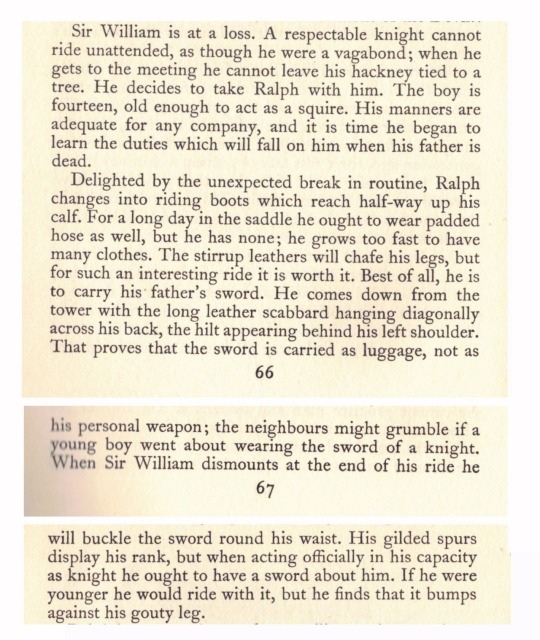
Unfortunately Duggan - though according to his Wikipedia entry "His novels are known for meticulous historical research" - doesn't give any cited source for this; his introduction to the book says:

I know the feeling! :->
I'd still trust him more than some modern historical writers who seem over-willing to add a touch of fantasy speculation / interpretation if it rounds out something inconclusive, makes the history more interesting or chimes with a personal agenda.
"Accurate" is better than "interesting", and "I don't know" is better than making stuff up.
*****
To repeat: I've yet to see any museum-exhibit or manuscript-illumination examples of BC / BD ever done For Historically Real with Western European swords, especially the hand-and-a-half longswords on which modern back-draw fans seem fixated.
A seax, scramasax or just plan sax is shorter, but yet again, this is the first time I've read anything even remotely scholarly about them or their later Viking-age version (saxes were associated more with Saxons than Vikings, guess why?) being BC / BD.
By contrast, there are at least three art instances of saxes worn horizontally, on 10th century crosses at Middleton Church, Yorkshire:

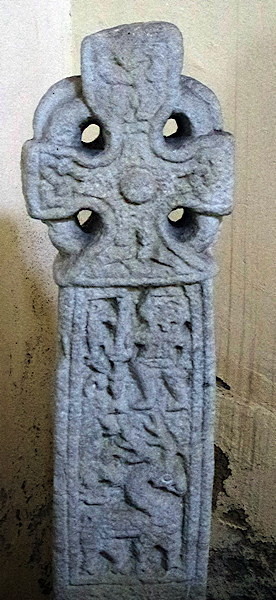
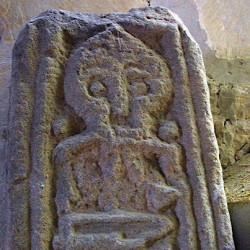
The art is backed up by surviving examples with scabbard-fittings still in place, indicating how they were worn. Here's one example, from the Metropolitan Museum, New York which makes that very obvious.
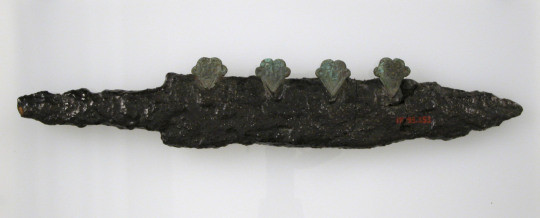
The little decorative masks (originally part of the top of the scabbard, now corroded onto the blade) are clearly meant to be This Side Up, and also show that this scabbard was This Side Out for a right-handed draw, since there's no detail on the back.
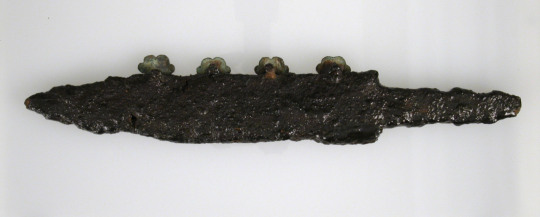
There's a similar fancy-front / plain-back / right-hand-use leather sax scabbard at the Jorvik Centre in York.
There's only a single photograph of this bigger one - 54cm (21.5 in) overall - from the Cleveland Museum of Art, with no way to see if the L-shaped scabbard mount is decorated on just one or both sides. However it does indicate the weapon was meant for horizontal wear.
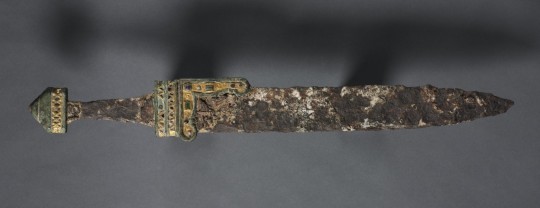
I've also flipped the website photo to show right-hand use, because "It seems..." (hah!) more probable. Here's why I did it:
For most of history being left-handed was unusual, a disapproved-of aberration and the origin of the word sinister.
Left-handers were useless in any formation from Ancient Greece through Ancient Rome to the Saxon and Viking period where the shields of a phalanx, testudo or shield-wall had to overlap for mutual support.
In the Middle Ages, both the specialised armour and the layout of jousting courses were almost 100% right-hand only.
Most surviving swords with asymmetrical hilts, such as swept-hilt rapiers, are made to for right hands not left.
Even nowadays many weapons - including the current British Army rifle (SA-80 / L85/A2) - are set for right-handers only.
*****
The longest saxes are called Langseax (surprise) though this may be a modern-ish term. Here's one from the British Museum, the so-called "Seax of Beagnoth"...

...which is 72 cm (28.5 in) total / 55cm (22 in) blade.
That's about the same as a Roman gladius (another sword never back-worn despite its convenient size) and is a good 25-30cm (10-12 in) shorter than the average "proper" sword of the same period, which means it could be drawn over-shoulder...
However the layout of its runic engraving shows it was almost certainly meant to be worn horizontally As Per Usual.
*****
And now we've come all the way back around to Prof. Price's claim that Vikings did BC / BD with their battle-knives.
Such a claim needs proof.
Please, show me some.
#arms and armour#back-carry#seax#scramasax#long knife#short sword#left-handed weapons#research#evidence
80 notes
·
View notes